


































Outstanding performance against key grass weeds and broadleaf weeds
Extended residual control
Flexibile use window without time-of-year restrictions
Dual mode of action for resistance management
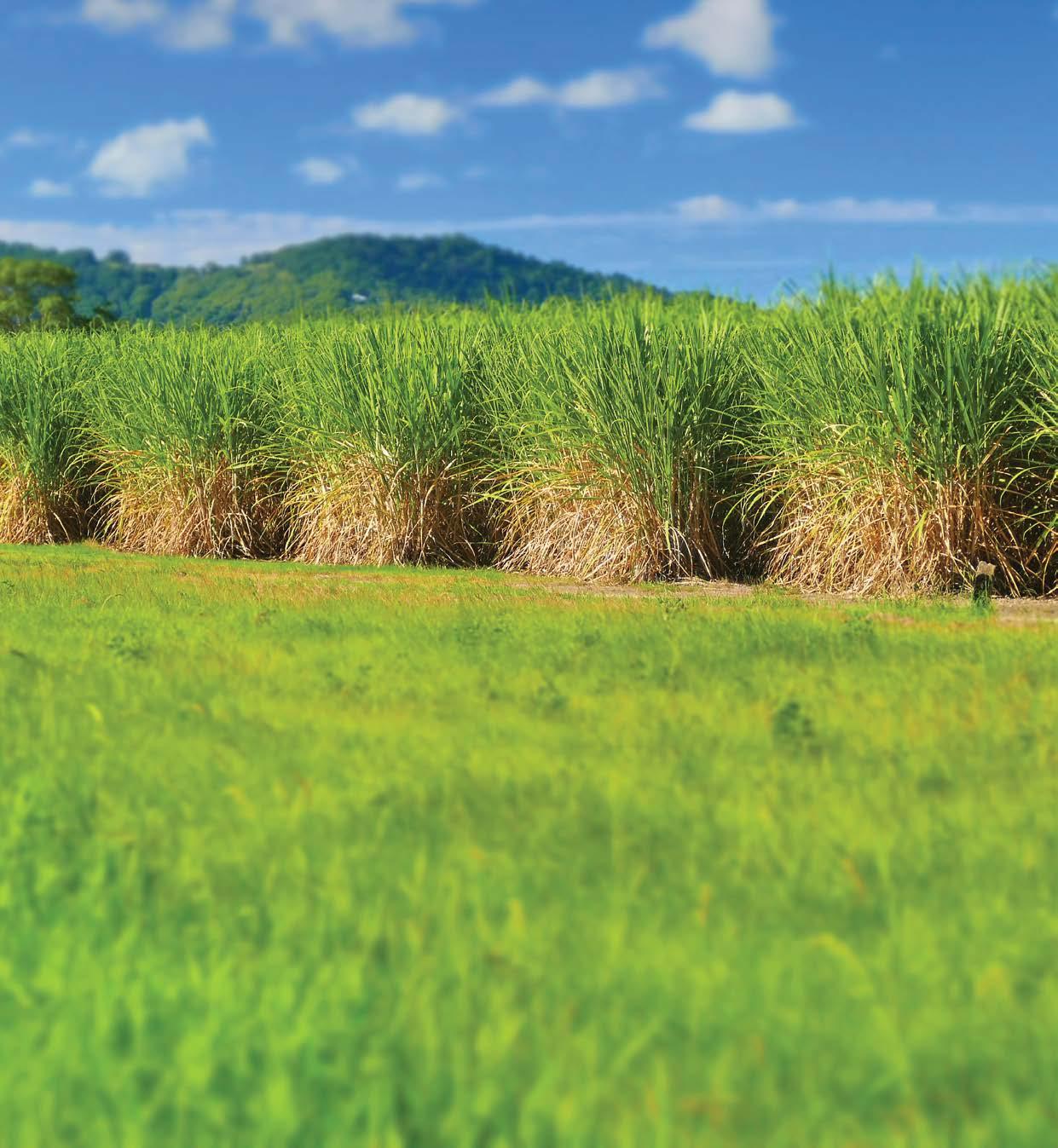
Long lasting, broad spectrum grass and broadleaf weed control
Flexible application in plant and ratoon cane
Flexible use window without time-of-year restrictions
Ideal rotation option with Bobcat® i-MAXX SG
® Combi WG for sustainable weed management


• Revolutionary nematicide for targeted control of Root-knot and Root lesion Nematodes
• Fast-acting and unique mode of action
• Minimal impact on beneficial and non-target species
• Fully-loaded – convenience of in-built surfactant eliminates the need for additional surfactant*
• Broad compatibility with herbicides and insecticides
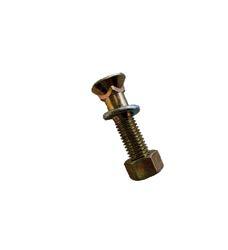































07
10
12
14


16
Editor:
Robyn Devine
Design & classifieds:
Eleanor Fraser
Articles appearing in Australian Canegrower do not necessarily represent the policies or views of CANEGROWERS.
Published monthly by:
CANEGROWERS, GPO Box 1032, Brisbane, Queensland 4001 Australia. ABN 94 089 992 969
Telephone: 07 3864 6444
Email: editor@canegrowers.com.au
Website: www.canegrowers.com.au
Subscriptions
Yearly subscriptions for 12 issues (postage included)
Within Australia: $190 inc GST
Overseas (AUD): $290
COVER IMAGE
CANEGROWERS Mossman Chairman
Matt Watson hopes the future looks brighter for the Mossman community after a mystery investor swooped in to save the
at the eleventh hour.
Photo credit: Richard Curzon
Read more on page 5
A new Chief Executive Officer will take the reins at the Australian Sugar Milling Council (ASMC) this month, replacing former CEO Rachele Sheard who left the role last year.
Former Chief Economist and General Manager Trade for the National Farmers’ Federation, Ash Salardini, will start in the role on Monday 18 March.
Mr Salardini has an impressive background in public policy and government affairs, having held key positions with Business NSW, Business Sydney, and the Australasian Railways Association before taking up the ASMC CEO role.

Friday 8 March is a great opportunity to celebrate the many achievements of the amazing women that are actively involved in the sugarcane industry as part of the International Women’s celebrations. Women hold all sorts of roles on farm, as growers, drivers, bookkeepers, roustabouts, cane analysis auditors, teachers and carers just to name a few! Read more about some of these remarkable women on pages 16 and 24.


Tributes flow for the Rocky Point sugar industry stalwart, Bill Heck, who passed away aged 90 late last month. Bill was a fierce advocate and supporter of the industry and the owner of the family-run Rocky Point Sugar Mill, one of the oldest of its kind in Australia. Many growers have worked with Bill and the Heck Group, his reputation as a pillar of the community was extensive.
According to former CANEGROWERS
Rocky Point Chairman Richard Skopp Mr Heck was a “strong advocate who always stood up for the sugarcane industry.”
“He was a leader in the industry,” Mr Skopp said.
“We relied on each other. He couldn’t make sugar unless we grew sugarcane, and we couldn’t grow sugarcane unless he was there to process it.
“But he was always friendly. Whenever we did meet, we always had a chat.”
Jet Zero Australia announced a deal with US biofuel firm LanzaJet to produce 102 million litres of sustainable aviation fuel (SAF) in Queensland each year. The engineering agreement will see a facility built at Cleveland Bay in Townsville, where LanzaJet’s alcoholto-jet technology will be used to convert bioethanol into SAF and renewable diesel.
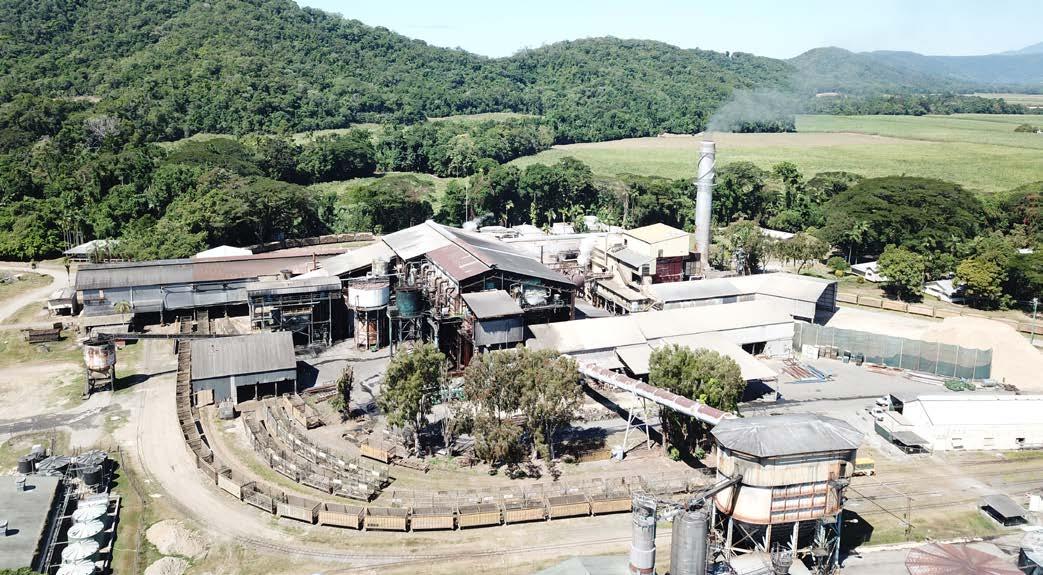
The future is looking a little brighter for the Mossman cane-growing community after a mystery investor swooped in to save the local mill just hours before the company was due to be liquidated.
Less than 48 hours before creditors were scheduled to meet to decide the mill’s fate, company administrator, John Goggins, advised grower and mill representatives that a potential investor had come forward to provide funding alongside green energy company, Clever Power.
Creditor’s met on 29 February and, after much debate, voted to accept a Deed of Company Arrangement, which triggered a 15-day window for the administrator and investor to clear any legal and financial hurdles and get a deal done.
CANEGROWERS Mossman Chairman Matt Watson said growers were shocked when told a mystery investor had come forward.
“It was a huge surprise when we were told a private investor was willing to put money on the table to save the mill,” Mr Watson said.
“Clever Power and the investor would take on the mill and guarantee crushing for at least the next four seasons as they worked to improve and increase production and make the mill more stable before looking to diversify into value-adding opportunities in the energy field.”
“We were concerned about how things would turn out when the investor seemed to have a change of heart at the last minute, and we all attended the creditor’s meeting not knowing for
sure what the outcome of all the hard work would be,” Mr Watson said.
“So, we were surprised and heartened when the administrator said there was a potential way forward with a third party and that it was with Clever Power.”
CANEGROWERS had continued to work on possible solutions right up to the last minute, even having representations with Community Cabinet in Cairns on 28 February
At that meeting, Queensland Premier Steven Miles announced the government would provide $12 million to either help a third party run the mill or help the community transition away from sugarcane.
“That was the first time we had it confirmed by the Premier that there was some government funding available,” Mr Watson said.
The last minute announcement of $12 million from the State Government may have helped push the Clever Power deal over the line at a time when the investor seemed to be having second thoughts.
“We knew we were staring down the barrel of the end of the cane industry in Mossman.”
The Chamber of Commerce meeting was held on 26 February where more than 170 community members expressed their concern about the consequences of a possible mill closure
Mr Watson praised the local council and Douglas Chamber of Commerce who made strong recommendations to government to try to save the industry.
“They called the community and businesses together to rally in Cairns at the Community Cabinet because of the real concern that the closure of the mill would be another disaster, on top of ex-Tropical Cyclone Jasper.
“We knew we were staring down the barrel of the end of the cane industry in Mossman and all the consequences that would flow from that.
“So, to have confirmed at the eleventh hour that someone has stepped forward to back the future of the industry, with a view to making the mill a profitable enterprise for the long term, it was just an amazing outcome for the industry and the community.”
Mr Watson said the Clever Power representatives had made it clear their focus over the next four years would be on producing sugar crystals and returning the mill to profitability.
“They sound like a very forward-thinking company, and they have big plans for the mill eventually, but only if those plans prove viable,” he said.
“They have assured us that they are here to work with growers and the industry. Their focus, first and foremost, will be on getting the mill operating. They are determined to make the mill profitable and one of the ways they plan do that is by increasing cane throughput.”
The combined result gives great hope to growers that after years of uncertainty, a new era is finally dawning for Mossman’s cane industry.
“It has been a stressful few years, and the past few months in particular have been especially worrying, but growers are heading into this year’s crush with a renewed sense of confidence in the future and that is fantastic news for the industry and the community,” Mr Watson said.

Tully cane farmers still reeling from December’s Tropical Cyclone Jasper deluge have been inundated again.
488 millimetres was recorded at Tully Sugar Mill on Saturday 24 February, causing flash flooding, washouts of culverts and headlands, landslips, and damage to rail infrastructure. This was on top of 275 millimetres in the seven days prior.
CANEGROWERS Tully Chairman Bryce Macdonald said the weather event was short, sharp and severe, with most of the rain falling over a sixhour period.
“Growers had only just started to fix the damage from Jasper and now there’s a second event in a close proximity to the previous event,” he said. “They’ve got to go and do it all again. In some areas, the flooding was 600 millimetres higher than had ever been seen before.” This was evident from the Bruce Highway along the stretch south of Tully where debris was visible on top of guard rails.
Danielle and David Kemp grow cane at Silky Oak, just south of Tully. They have experienced plenty of flooding events, but this one stood out.
“The flood level was higher than the December flood event. Intense rainfall over a short period of time resulted in strong currents laying cane over” Danielle said. “We had a shipping container float into one of our blocks



from a neighbouring property around 500 metres away. It’s going to require a crane to remove it.”
“A lot of farmers had water go through sheds that normally wouldn’t flood and it was also close to entering neighbouring houses. Thankfully, there was not as much trash moved in the floodwater and deposited on the crop because it had already been taken away in the December event!”
Mr Macdonald said the real concern now is the looming 2024 crush,
proposed to start less than 100 days away. “Having the infrastructure in poor condition or unserviceable condition is a real worry for affected growers,” he said.
“In addition to growers being impacted, businesses that service the agricultural sector are also feeling pressure due to the disruptions. Traditionally, we have about six more weeks of wet season to get through, hopefully it will be a little kinder in the near future.”


Take Control of Your Own Energy Generation and Supply and transform your operations. The benefits are plenty: cost savings, power reliability, support of operational growth while limiting your energy costs, and many more.
A growing number of farmers in Southern Africa, who deal with similar or worse weather conditions as those in Australia, have turned to Freedom Won technology to transform their agriculture operations.

The BESS has been installed to ensure optimal energy storage via PV or the grid, while still tied to a diesel generator as an additional backup source to make sure the customer has power at all times.




Many more installation references with Freedom Won Technology are available today from farmers with similar and different benefits depending on the specific circumstances of their operations.

As a showcase of what is possible, Louma Commercial Farming in South Africa which runs 30,000ha of commercial farming, started with a Phase 1 installation that consisted of a 2,4MWh Freedom Won Battery solution. In the interest of energy security and cost savings, the installation was given the green light. This solution has since helped the farm go completely off the grid with a 7,5MWp PV generation system and 6,5MWh of energy storage solution, supplying the whole farming operation through 23km of overhead lines. The technology used was a ground mounted PV system connected to a Freedom Won Turnkey Power Room with utility / commercial scale inverters and the Freedom Won Industrial High Voltage battery range. The main benefits to Louma from this solution are an approximate electricity cost saving of ZAR 4million/month, the supply of power to areas of the farm where power could not be supplied before due to the high expense, Improved living conditions for the farm workers and the security of reliable power at all times to ensure uninterrupted operations.
Another client who also greatly benefitted from Freedom Won energy solutions is the Springfield Wine Estate in South Africa, which has now gone total green! Now equipped with a 1200kWh energy storage capacity, power outages are a thing of the past, and the wine is kept fresh and flowing without worry.
Freedom Won is a pioneering, original equipment manufacturer of energy storage systems, offering BESS solutions for residential, business, commercial and industrial use since 2010, and made the first Lithium Ion Phosphate battery outside the Chinese Electrical Bus Program at the time.
With the design and manufacturing done in South Africa, and local solution and technical support from Freedom Won Australia, the Freedom Won Energy Storage Brand is what the Australian Cane Growers can truly trust and rely on to fulfill their energy demands. Our passion for providing a reliable, high performing and safe product, supported by a local Australia warranty and technical support, is what gives you complete peace of mind and sets Freedom Won apart from the rest.
We use proven and tested solutions with regards to inverters for our integrated solutions. Freedom Won Australia can provide you with a complete solution that is tailored to deliver on your needs.

You are only ONE CLICK away from the best advice, services and support you need for your business’s energy needs. Contact us for a free consultation using the links below.
www.freedomwonaustralia.com
Email:sales@freedomwonaustralia.com

We often talk about how intrinsically agriculture is linked to our communities.
The nature of farming means that our impact on community goes far beyond what is often considered the ‘standard metrics of impact’, like employment and turn over.
To support our advocacy efforts, we regularly study the impacts sugarcane growers have within the community. We delve deep down to better understand our role in local employment and economic contribution.
As a result of this research, we know farming has a deep impact on the broader community.
CANEGROWERS has completed research that confirmed that for every dollar a cane farm spends in the community $6.42 is generated in economic value.
It is this kind of analysis that has been top of mind as we witnessed the recent struggles of the local community as it tried to save the Mossman sugar mill.
It may be only one business and one industry, but it has been the community that has pulled together to try to save the mill.
The sugar industry is more than important to this community, it has literally been the backbone of the Mossman community, supporting 150 mill jobs and another 300 or so across the sugar industry.
The loss of the mill would have impacts on real estate, schools, community groups and most importantly families and real people.
The loss of the second largest industry in the Douglas Shire would be a huge blow. From a growers’ perspective it would be devastating—eighty-five growers supply sugarcane to Mossman Mill.
Mossman and the growers have been backing this mill for decades, contributing over $7 million in cash over the past

five years and now they have $14 million invested in this current year’s cane crop.
The cane grower community has worked tirelessly to make the Daintree Bio Precinct model work in Mossman. Many promises and commitments have been made, some have worked while some haven’t, but the growers have stood solid and fought for the future of their industry the whole time.
The grower leaders in the area have been active, thoughtful and worked hard to keep their industry alive. They should be proud of their impact on the community, no matter what lies ahead for the future of the Mossman mill its future will be secured if the growers are confident it is in safe hands.


Make time this year to focus on where you want your business to go
These half day sessions provide hands-on tools for either you or someone on your team and this year will be provided FREE of charge.
LOCATIONS & DATES:
• Childers: 19 & 20 March
• Herbert River: 10 & 11 April
Other locations & dates will be confirmed soon—keep an eye on our webpage.
BUSINESS BOOKKEEPING
Streamline administrative tasks
FARM RECORD-KEEPING
Overview of tools and templates for the business
Managing amidst uncertainty
Future risks and opportunities for the market
This program is jointly funded through the Australian Government’s Future Drought Fund and the Queensland Government’s Drought and Climate Adaptation Program.
Visit www.canegrowers.com.au or your CANEGROWERS district office today to find out more!
website or using the
CANEGROWERS Next Ratoon has been successfully launched in Brisbane on Tuesday 27 February and the word on the street is the program is a fantastic opportunity.
This integral mentoring program connects eager and aspiring young growers with experienced and knowledgeable mentors from both inside and outside the industry. Participants will build strong connections, networking skills, negotiation, decision-making and leadership skills, as well as
accumulating a wealth of knowledge that will help them contribute to a profitable and innovative sugarcane industry.
Bessie Orr, a young grower from Proserpine, said she was looking forward to learning as much as possible to assist her to grow her career in the industry.
“I see this as a good way to help me reach my goals. I already have a full schedule and I think this is necessary to help for my future.”
Liam Wallace said he had started his own business, and this is a great




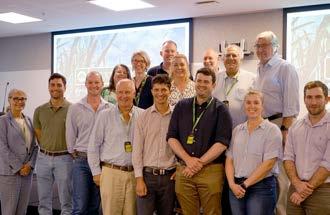
opportunity to gain knowledge and to help his new venture.
“I think many people in the industry will want to have this type of experience— either as a mentee or mentor. There’s so much to learn,” Mr Wallace said.
Australian Canegrower will follow the participants over the course of the next six months to see how this program assists and supports growers in the industry.



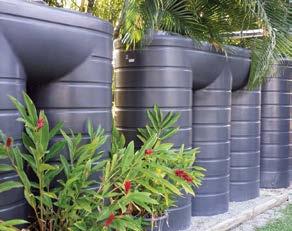









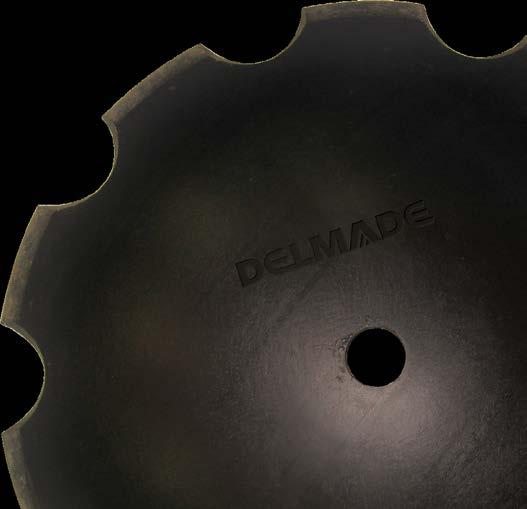


With local government elections coming up this month, it’s a good time to reflect on what action we want from our council representatives.
Local government has many responsibilities, but three areas in particular impact us as farmers—rates, biosecurity, and local planning regulations.
The role of a councillor is not an easy one, given the rules and boundaries imposed on them by the State Government, but it is our role at CANEGROWERS to help empower councils to work through these issues to keep our local communities thriving.
Independent analysis has shown that for every $1 worth of cane grown, the industry generates $6.42 in income for the economy, so it is important that issues affecting cane farming are part of council planning and practices going forward.
Rating practices vary across councils. In some areas cane farmers pay reasonable and sensible levels of rates, whereas in others, they are disadvantaged compared to other small businesses.
Councils need rates to function, and all farmers are willing to pay their fair share, but we should not be taken for granted or used as a cash cow to pay for unnecessary services.
CANEGROWERS has been working with the Queensland Farmers’ Federation to counter unfair rating practices, and at the Local Government Association of Queensland (LGAQ) conference in October some councils looked to have these issues raised with the State Government.
Sugarcane farming is the cornerstone of most of the communities it inhabits, so growers should be treated fairly and equitably.
Local biosecurity is also the responsibility of councils. Be it pigs, rats, coots, wallabies, fire ants, or any number of invasive plant species, all fall under council management to some extent.
CANEGROWERS is also very active in this area, whether it be by applying for permits or baits, or by pushing state or federal governments for more assistance.
Therefore, council policies and procedures around biosecurity are very important to growers and should be part of any discussions you have with your local councillor.
The other major issue that councils are responsible for which affects growers is planning regulation.
In many areas urban and industrial encroachment on good farmland is a serious issue. The planning around these developments needs to be transparent and fair for the growers involved.
Also, renewable energy projects including solar and wind, and the infrastructure that supports them, need to balance the requirements of the local sugarcane industry. When land available for cane shrinks too much it can reduce mill viability, which has long term effects on the local community.
On another topic, this month’s magazine highlights the role of women in agriculture. It coincides with the launch of the National Farmers’ Federation’s Diversity in Agriculture Leadership program, which opens in March. I would encourage all female aspiring leaders to apply to be part of the program.
I would also like to note the passing of former CANEGROWERS director Tom Callow. Tom was a very forward thinker and liked to challenge the direction on every issue. He was strong advocate for the Fonterra model for our industry, in that growers control their own destiny with the whole of industry working together. I would like to pass on condolence to his wife Jan and all his family.
Women
Powering Agriculture
Women
Powering Agriculture














Grower representation in the sugarcane industry has traditionally been led by males, but over time an increasing number of females have picked up the wheel and continue to drive the industry forward.
Annie Attard has been a vibrant director of Bundaberg CANEGROWERS for eight years and is an integral player in the well-known and respected Attard Family Farms enterprise, located in the lucrative and fertile soil of the Burnett Heads region.
At any given time, Annie has her hands full juggling a multitude of tasks and demands on her time, as the family business grows a range of crops including tomatoes, rockmelons, cane and nuts. Nonetheless Annie manages to navigate her time to be an active representative for the Bundaberg sugarcane community.
Annie and Jason Attard have been married for 23 years and brought up five children on the farm, working

alongside Jason’s father Francis. Now their 29-year-old son, Hayden and his partner Tegan, help on the farm and Annie is keenly mentoring them to be more involved in the family business.
While Annie didn’t grow up on a farm, she happily embraced the lifestyle and enjoys working with her family and taking up the undertakings involved with growing such a variety of crops.
“Originally, I’m from New Zealand, I moved to Queensland when I was 22 years old after serving five years in the New Zealand Navy,” Annie said.
“Jason is a third-generation grower, his grandfather Joseph came from Malta and started farming in the Bundaberg district, his son Francis, my father-inlaw, took over the farm when Joseph passed away. Jason left school at 15 and started working on the farm and has been there ever since.
“With Hayden and Tegan involved now, we’re slowly starting to teach the young ones what to do, so we can step back. They really love the farm life and are interested in being involved.”
Annie was approached by Dale Holliss, the previous district manager for Bundaberg CANEGROWERS , to take on a director’s position with the board and she said while initially the experience was a little daunting,
Annie, left and the Bundaberg Women in Sugar organising committee hosted a successful WISA Conference in 2023“You have to have a bit of skin in the game to know what’s happening. The way I see it, you can’t just sit there and expect everybody else to tell you what’s going on”
she felt extremely well-supported and continues to enjoy the learning experiences that she has undertaken.
“I had never had a lot to do with cane before that, Jason and Francis had always managed that side of the business. I was more involved with the small crops, but this role gave me the opportunity to learn about the industry,” Annie said.
“I was the first female director in Bundaberg, and at first, I was a bit apprehensive. I thought who is going to take me seriously when its mostly a male dominated industry, but I have had so much support, and I don’t get overlooked or people don’t look at me like I don’t know what I’m talking about. “Dale gave me some good advice, he said, ‘every question is a good question— there are no dumb questions.’
“I’d recommend people not to be afraid to step up and take on representative roles, or even when attending meetings make sure to ask the questions you have, you learn more that way.
“I got involved with Bundaberg CANEGROWERS board, and now I’m on the Sugar Services and Women in Sugar boards and I’m the grower representative for QSL—I do wear a few hats.
“I enjoy learning about the industry, because it’s our livelihood.
Annie is also encouraging of the younger generations to get involved in the industry, in any capacity.
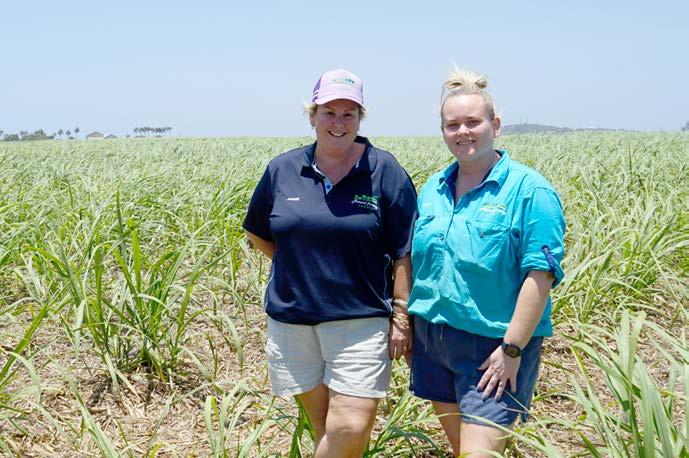
“Hayden and Tegan really enjoy the farm life and I get them to come along to the meetings to learn things for themselves,” Annie said.
“Hayden does a lot of the physical work on the farm, he’s the harvest driver, he fertilises, he sprays, he plants, it’s good for him to learn to understand the other side of the business as well as the physical side.
“We are working through the Smartcane BMP modules and have had a program prepared by an agronomist to meet our reef regulations, Hayden and Tegan are managing that for the farm and learning about the N & P budgets. It’s good that they’re both interested in doing that and they enjoy doing it together.”
Tegan agreed that the lifestyle, flexibility and the variety of work available on the farm was what had helped her make the change from her hairdressing career to farm life.
“I like learning about the industry and there’s always a lot to learn so it’s always different”
“I needed a change, Hayden and I both wanted to be involved and I enjoy being outside,” Tegan said.
“The chance to do a bit of everything is enjoyable, it’s not the same thing every day.
The family is a good fit, by playing to the strengths of each team member, from the youngest to the oldest, they maintain a highly successful enterprise, even 83-year-old Francis is still actively involved on farm.
Annie’s inclusive leadership supports the family to work successfully together, assisting to navigate any potential challenges that may arise when working across multi generations.
“I am proud of the way our family works, we have been around for a long time, we have a good name, and we do the best that we can with what we have,” Annie said.
“For us it’s just normal to work together, Jason is an only child and Francis lost his wife 13 years ago, so we have always worked together.
“The family that are here, want to be here, it’s not like they have to be here, it’s a choice to be part of the business.”
Annie and Tegan enjoy actively working in the family business
Sugarcane growers have attended advanced weed management workshops for tips on how to achieve the best results for their knockdown herbicide spend.
The half day workshops at Babinda and Tully were run by SRA Weed Scientist Emilie Fillols (pictured) with the assistance of Nufarm development managers, Mark Rantucci and Malcolm Salisbury.
More workshops are planned in coming months for the Burdekin and Ingham.
Emilie warned about the times when herbicide damage was most likely in sugarcane.
“Sugarcane is particularly susceptible to herbicide damage when it’s at the four to six leaf stage in young plant cane,” Emilie said.
“That’s the time when we believe the emerging cane is using all its energy

to build its own root system, rather than relying on the sett roots, and it has fewer resources to break down the herbicide if it accidentally lands on it,” she said.
To cause no damage to the crop, the label directions must be strictly followed, Emilie said.
“When adding adjuvants, more herbicide will enter the weed leaves but also the sugarcane leaves and the spray may affect your crop. There’s a tipping point where the plant no longer has the resources to break down the herbicide.”
The 2,4-D group which includes fluroxypyr, picloram, dicamba and others, targets the plant’s hormones.
Emilie warned that spraying weeds in sugarcane during the crop’s rapid growth period say, from December to March, could see damage in the form of side shooting, arrows and other strange growths.
“You could use a less selective herbicide in cane so long as you only touched the stems and not the leaves of the crop,” she said. “For this reason, droppers and a directed spray technique such as spot spraying is safest.”
Mark Rantucci and Malcolm Salisbury gave practical demonstrations of droplet size and spray quality using different nozzle sizes, speed, pressure rates and the effect of adjuvants. They described spraydrift as not only often devastating to a neighbouring farmer but a financial loss to the grower. It could be prevented by looking up a readily available spray quality chart to match nozzle size with the label requirements for the chemical.
They warned that the regulatory authorities had tackled off target movement of pesticides such as 2,4-D by changing the nozzle requirement from coarse up to very coarse to cut the risk of driftable fines in half.


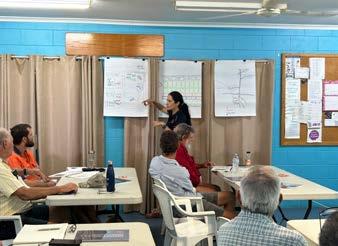
To work out what nozzle size is needed here are some tips:
1. The bigger the target the coarser the spray quality should be.
2. What’s the type of chemistry you’re using? For systemic action, use bigger spray droplets. For a contact herbicide like paraquat— choose a finer spray quality to increase coverage.
3. As the risk of spraydrift increases so should your spray quality get coarser.
4. Pressure: The higher the pressure, the more spraydrift will be created.
5. Boom height: the higher the release height of the nozzle, the higher the risk of spraydrift.
6. Weather: spray in unstable air conditions with a regular breeze

of about 11 km/hr—the warm rising air will mix with the cold air in the atmosphere. The riskiest time to spray is in still conditions in the early morning at sunrise when inversion layers occur.
7. Check your nozzle’s spray coverage with UV dyes or by using water sensitive paper.
Farmers across Australia have been left bamboozled by the Government’s attempt to legislate a new tax on farmers, despite a tidal wave of expert criticism.
The Albanese Government tabled new laws to establish the ‘Biosecurity Protection Levy’ on Wednesday 28 February—intended to raise $50 million from farmers to bankroll activities that assist importers, airlines and other risk creators.
National Farmers’ Federation (NFF) President David Jochinke said the move was “utterly staggering” given the level of opposition to the policy.
“Everyone from the Productivity Commission to the Australian National University and the Freight & Trade Alliance has labelled this policy a dud. It makes zero economic sense.
“No farming group wants it. It’s an administrative nightmare. And now we even have the importers themselves calling to scrap it and send them the bill instead!
“We’re shocked to say that they’d ignore the unanimous voices of farmers, importers and policy experts. If they aren’t listening to this broad church of voices, who are they listening to?” MrJochinke asked.
The tabling of legislation has been accompanied by a media announcement of a ‘Sustainable
Biosecurity Funding Advisory Panel’— aimed at easing industry concerns about oversight of the funding. Mr Jochinke said the announcement had been met with cynicism by industry stakeholders.
“It’s pretty clear this panel is being tacked on at the 11th hour to try and give the levy some credibility.
“We note the Panel doesn’t seem to be reflected in the legislation tabled today, so it certainly doesn’t guarantee farmers the oversight they were seeking. Once again, that’s completely out of step with the usual design of industry levies.”
The NFF is now calling on parliamentarians to reject the bills.
“If the Government won’t listen, we can only hope that the Opposition and crossbenchers will,” Mr Jochinke concluded.


The removal of UK tariffs for Australian sugar following Brexit has sent demand and prices skyrocketing. So, calculate how much your returns and income would increase by switching to sugar production, then get a Celli Spike Rotor, proven to produce a better performing crop with:
Even
Better
“The
Don’t wait. Take full advantage of the sugar boom with the Celli Spike Rotor and Celli Bed Former 1800 327 642 | +613 8001 3015 | sales@farmgard.com.au | sugar-smart.farmgard.com.au/farmer

Brazil
India
Thailand
Speculators
Currency
Precipitation in Centre South Brazil has continued to disappoint with below-average rainfall recorded for 10 weeks in a row to the first half of February. While not critical yet, the 2024/25 crop is at serious risk of being compromised, with some experts forecasting a sugarcane crop of under 600 million tonnes if rainfall fails to increase in the coming weeks. Neutral
Harvesting in India has progressed at a reasonable rate with fine weather conditions providing little interruption. By the end of January, 193 million tonnes of cane was harvested and 18.7 million tonnes of sugar was produced. Consensus for the 2023/24 Season remains stable at 31-31.5 million tonnes of sugar.
In addition to poor sugar yields, crushing operations have slowed in the central and eastern regions of Thailand due to wet weather interruptions, leading the Thai Sugar Millers Corporation to reduce their forecast to 7-7.5 million tonnes of sugar. As of 11 February, 60.2 million tonnes of cane had been harvested and 6.1 million tonnes of sugar produced.
Neutral
Speculators continued to show little interest in the ICE 11 raw sugar futures market as they awaited on fresh fundamental developments to entice meaningful deployment of a long position. The ICE 11 Commitment of Traders report as of 13 February 2024 recorded a net long position of 33,530 lots. Neutral
The Australian dollar came under heavy pressure in February following revisions to expectations of early 2024 US rate cuts. With the latest US inflation data printing above expectations at 3.1% year-on-year, the outlook for interest rate cuts has been pushed back to the second half of 2024.
The outlook ratings above are in relation to AUD/tonne sugar prices. A bullish outlook is considered positive. A bearish outlook is considered negative.
The highest grower-managed pricing levels achieved across all growing regions using QSL products to date (all gross price actual/tonne) are:
• 2023 Target Price = $950 / IFC $960 (Mar24)
• 2024 Target Price = $840 / IFC $870 (Jul24)
• 2025 Target Price = $735 / IFC $735 (Oct25)
• 2026 Target Price = $685 / IFC $690 (Jul26)
• 2027 Target Price = $650
Key Dates:
• 10 March: Last day for QSL Direct growers to apply for QSL’s Pre-Crush Advance Payment Scheme.
• 30 April: Last day to nominate tonnage to QSL’s 2024-Season Actively Managed Pool, Guaranteed Floor Pool, Individual Futures Contract and Target Price Contract.

When Michael Turner took on a 6-month contract to join his Dad on a Fiji disease surveillance gang in 1974, he had no idea it would launch a career spanning five decades.
“At the time, Ken Corrie was the Millaquin/Qunaba Cane Pest and Disease Board supervisor, and I joined Jack Purkis’ gang working alongside my Dad and five or six others,” said Michael. “It was a serious job and we worked hard roguing out infected stools, but it was a great team to work with. There was never a day that someone in the gang wouldn’t play a practical joke on his fellow gang members. Plenty of snakes and the odd flying pine melon to look out for!”
After a few years of trying to eradicate Fiji disease from the district through inspections, roguing and compulsory ploughouts, the focus shifted to monitoring and counting diseased stools as resistant varieties were introduced to the district.
“In the late 1970s, a mother plot was set up at Toweran, north of Gin Gin, to supply disease-free planting material to secondary increase plots. The Millaquin/Qunaba increase plots were at Granite Creek, near Lowmead, and at Mahogany Creek, near Bundaberg, and they supplied the new resistant varieties to growers as ‘kilogram cane’,” said Michael.
“Varieties like Q87, CP44-101, Q108-Q111 were introduced to the area and by the early 1990s, Fiji disease was eradicated from the district.”
A revised kilogram system was introduced in the early 1990s to supply approved clean planting material after closing the secondary increase plots. The ‘kilogram cane’ system continued until the end of the 2021 season.
In 1992, when Ken Corrie retired, Michael was appointed to the Supervisor’s role for the Millaquin Cane Protection and Productivity Board (MCPPB). Twelve months later, the MCPPB created separate roles and employed a productivity officer to assist growers with crop nutrition and irrigation, and Michael continued to
provide pest and disease monitoring and management of the approved seed cane program.
“Soldier fly, canegrubs, and pink earth pearls required ongoing monitoring, and in the early 2000s, orange rust was found in the district,” he said. “Orange rust took away variety Q124, which could have been a promising commercial variety for growers in this area.”
Then, in 2006, sugarcane smut appeared in variety Q205A, and Bundaberg growers lost many of their commercial varieties except for Q151 and Q155. Fortunately, resistant varieties such as Q208A, Q177 and Q200A were available in north Queensland to fill the variety gap. Several truckloads of planting material were brought to the Bundaberg area to fill the gap until new resistant varieties were released.
The path to full deregulation of the sugar industry resulted in significant changes for the Pest Boards and the wider sugar industry. Sugar Services formed in 2002 to bring the Bingera, Fairymead and Millaquin pest boards together under one banner. The newly-formed Sugar Services partnered with BSES
and was based at the BSES Research Station on Ashfield Road to provide extension services to growers. In 2005, Bundaberg Sugar Services became a company in its own right as part of the final stages of industry deregulation.
“Being stationed at BSES for the period 2002 to 2012 kept me informed of results and outcomes of the BSES research projects, and the extension work was very interesting,” said Michael. “One trial that stands out was working with BSES extension officer Bernie Dominiak in the early 1990s to test various control methods for pink earth pearls. We didn’t find an effective control agent, but I was fascinated by the behaviour of these insects. We found they would come to the soil surface at about the same time each morning for an hour or so, then retreat again into the soil profile.”
“One day, Bernie and I went to the trial site at the usual time, and we couldn’t find any pearls—then we realised that we’d been caught out on the first day of Queensland’s daylight-saving trial!”
Once deregulation of the sugar industry was in place in 2005, growers could choose which sugar mill they supplied, and approximately 8000 ha was transferred from Bundaberg Sugar mills to Isis Mill. This resulted in the closure of Fairymead Sugar Mill. A further 4000 ha were transferred to Isis in 2008, and while some of this land still grows cane, much has been converted to other crops.
While many changes have occurred over the years, the most significant change has been to the sugarcaneharvested area in this district.
When Michael began work in 1974, approximately 30,000 ha of sugarcane was harvested in the Bundaberg growing area. The area peaked at around 39,000 ha in the early 1980s and has slowly declined to the current harvested area of 11,500 ha in 2023, primarily due to expansion of other crops like sweet potatoes and fruit and nut trees, and urban encroachment.
Yellow Canopy Syndrome (YCS) was first observed in the Burdekin and far north areas in 2012-13. It was not until 2016 that the first symptoms of Yellow Canopy Syndrome (YCS) was found/ observed in the Bundaberg mill area in a block of Q240A plant cane. There did not appear to be a significant yield loss to affected blocks. When conditions are favourable yellow canopy syndrome can still be found in blocks across the district.
The introduction of one-eye sett seedlings in 2019 was the most recent change to providing disease-free planting material to growers. Bundaberg Sugar Services board approved the one-eye sett method in 2018, and then Michael established germination and nursery facilities and protocols to ensure growers can access new varieties to bulk up on the farm.
“In spring 2019, we supplied 6000 seedlings to growers in the Bundaberg area, and last year, we supplied 95,838 seedlings (2023) from a list of 22 varieties available to our growers,” says Michael.
The one-eye sett seedlings are generated by cutting cane stalks
on either side of the nodes. These sections are dipped in fungicide, placed in crates and kept in a temperature-controlled container for a few days until they germinate. They are then potted into trays and moved to an outdoor nursery to grow out for five to eight weeks before they are supplied to growers for planting. Sugar Services also hires a small planter to growers as required to make it easier to plant larger areas.
“In the 50 years I’ve worked in the industry, I have built great relationships with local growers and staff from Bundaberg CANEGROWERS , BSES/SRA, Bundaberg Sugar, other Productivity boards and industry organisations, and many other people I’ve worked alongside,” said Michael.
“You get to know people and hear a lot of grievances as growers grapple with major changes and issues like low prices, high input costs, and, more recently, Reef regulations. I’ve learnt to listen and give growers time to express their worries, then when the air is clear, sometimes have a cup of tea, then go to the field and plan a strategy to remedy whatever was happening there.”
 Michael has been instrumental in the successful establishment of the one-eye sett seedlings nursery and associated protocols
Michael has been instrumental in the successful establishment of the one-eye sett seedlings nursery and associated protocols

Donna Campagnolo’s vast and unique combination of knowledge, abilities and experience is helping to steer the strategic direction of Australia’s sugar industry.
Silkwood cane grower Donna Campagnolo wears many hats. She’s also a scientist, an agronomic consultant, a horticulturalist and a biosecurity expert with experience in corporate governance, value chains, and export markets.
Donna holds a Bachelor of Science in Botany Zoology and over her career, has worked with a range of tropical fruit growers for the Queensland Department of Agriculture, most recently as the Manager of Operations for the Panama Tropical Race Four biosecurity program in the banana industry. She’s also researched and grown teak trees for a management investment scheme and owns and manages Australia’s only commercial pepper farm.
But whatever the task at hand, whether it’s clonal evaluations, fertiliser trials, integrated pest management, or dealing with government departments (and she’s certainly done all these and more), Donna always has a practical approach. She’s bringing that mindset, along with her ability to think strategically, to her latest role as Grower Director on the Sugar Research Australia (SRA) board. The third-generation cane grower is at the forefront of driving the organisation’s strategic direction, and she said it’s an exciting time.
“I think the way SRA is looking at the sugar industry is not just as sugar,” she said. “We are looking at the other things growers can benefit from out of growing sugarcane. I think that’s
Donna’s farm in picturesque Silkwood—photo credit Will Darvenzia
probably the way it needs to go for us to be viable. Every year, our margins become smaller and smaller, so you need a thousand hectares to make money.
“The problem is that growers get paid for the sugar, they don’t get paid for the fibre or the molasses. If there’s more diversity in terms of what we can get out of the crop, that would have to change and be reflected in the Sugar Industry Act. Otherwise, it would be up to the mills to have to change that formula. It could be particle board or cogeneration, whatever they make, the grower has to get something out of it. I think that’s important because fuel, fertiliser, machinery, wages for harvesting crews, all these costs have gone up.”



“Varieties are important and that’s probably the mainstay of SRA but there are a lot of other potential challenges and opportunities the industry needs to plan for, even if it’s in the background. But you’ve got so many competing entities for research. I’d like to see more collaboration and less doubling up when it comes to research projects.”
Donna is well aware of the importance of her scientific and governance experience in the SRA role. “I hope my scientific mindset doesn’t skew my thinking,” she mused. “Science is evidence-based and even a ‘no result’ is a result.
“The industry has to be innovative to be competitive. Failure is a result. Even in variety breeding, the failures are part and parcel.
“If there’s transparency in decisions you make, to me that’s fine. If they’re decisions that people don’t like, it’s important that you can show why you came to a particular decision without any conflicts of interest.”
Donna purchased 47 hectares of cane land in the Innisfail District from her father Levi and Uncle Louis almost two decades ago, and today also leases a further 37 hectares. On any given year, she fallows around 10 hectares of land.

Improvements to the property in recent years have included an in-drain denitrifying bioreactor and extensive fencing on the farm’s rainforest border to keep feral pigs out.
Her other passion is pepper, carrying on a project her family began in the 1980s. “Dad worked in the Philippines, Indonesia, Argentina and Florida,” Donna said. “He’d do a couple of months helping set up cane plantations and upskill in terms of technology. He saw the pepper growing during those trips and decided to import some plants.”
The crop is predominantly grown in an equatorial climate. The Innisfail district has suitable conditions, being 17° south of the equator and in Australia’s wettest region. “Pepper needs high rainfall, that’s how it flowers,” Donna said. “Around 100 millimetres is required to bring about flowering.”
The vines are grown around hardwood posts. Donna’s crop is pesticidefree, with parasitic wasps used as a biocontrol to deal with problem insects.
During a frantic two-week window, usually in October, the peppercorns are hand harvested. Two to three tonnes of product are picked, processed and packed every year. Whilst it’s hard work in a narrow time frame, Donna said there is strong demand, with the pepper usually sold out well before the next harvest begins.
Donna uses her knowledge of science and farming practices to successfully grow not only sugarcane but pepper in the tropical north—photos credit Renee Cluff
We would like to thank Mr Greg Zipf of Raylorn Farms for sharing his observations in his Sugarcane operation located in the Rocky Point region of South East Queensland.
We would like to thank Mr Greg Zipf of Raylorn Farms for sharing his observations in his Sugarcane operation located in the Rocky Point region of South East Queensland.

Greg (pictured) has been applying Flinders Agriculture Calcium Silicate at a minimum rate of 4.5t/ha via belt-spreader for nearly 10 years.
Third-generation cane growers, Greg and his family supply cane to the Rocky Point sugar mill and also grow soybeans as rotation.
Greg (pictured) has been applying Flinders Agriculture Calcium Silicate at a minimum rate of 4.5t/ha via belt-spreader for nearly 10 years.
Since starting to use Flinders Calcium Silicate, Greg has seen both crop health and yields increase in cane and soybeans. Greg says his return on investment has been well worth the outlay.
Third-generation cane growers, Greg and his family supply cane to the Rocky Point sugar mill and also grow soybeans as rotation.
Since starting to use Flinders Calcium Silicate, Greg has seen both crop health and yields increase in cane and soybeans. Greg says his return on investment has been well worth the outlay.
BENEFITS OF FLINDERS CALCIUM SILICATE IN SUGARCANE
Increases sugarcane yield and crop health
Stimulates root growth with greater root mass
• Increases sugarcane yield and crop health
Increases the plants natural ability to resist pests and disease
• Stimulates root growth with greater root mass
Increases fertiliser uptake and efficiency particularly Nitrogen, Potassium and Phosphorus
• Increases the plants natural ability to resist pests and disease
Increases the plants natural ability to tolerate stresses such as drought and salinity AND MORE
• Increases fertiliser uptake and efficiency particularly Nitrogen, Potassium and Phosphorus
• Increases the plants natural ability to tolerate stresses such as drought and salinity AND MORE
Flinders Calcium Silicate is one of the most economical sources of Silicon AND Calcium.
Flinders Calcium Silicate is recommended to be spread and combined prior to planting.
Flinders Calcium Silicate is recommended to be spread and combined prior to planting.
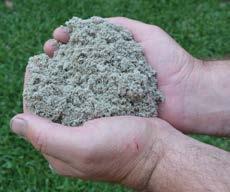
The National Farmers’ Federation’s Diversity in Agriculture Leadership Program supports women in agriculture to elevate their leadership through mentorship, networking, and industry partnerships.
The program is designed with women in mind—tailored to suit the needs and schedules of women in agriculture.
The 5-month intensive program is a short, sharp mentoring opportunity that provides flexibility, a community of likeminded peers, and support to elevate your leadership to the next level.
Each year, the program welcomes a select group of 12 aspiring leaders, ensuring an intimate and personalised experience. This allows the program
to focus on an individual’s unique strengths, aspirations and challenges.
The program is making real headway towards improved gender representation across agriculture and now boasts an alumni of 64 graduates who have gone on to become changemakers in their industries and communities.
These graduates include executives and CEOs, business entrepreneurs, board members, community leaders, industry ambassadors and advocates.
To apply you must:
Be 25 years of age or over
Have a connection to agriculture and a vision for it’s future
A strong interest in developing leadership skills through mentoring
Have taken a demonstrated step towards industry leadership
A desire to expand your networks

Let’s be honest, Smartcane BMP’s inception was originally to combat Reef regulations. But while the program has done much more than this, we still hear the criticism that ‘its only about regs and doesn’t apply to me’.
Smartcane BMP facilitates and recognises the adoption of improved farming practices that reduce compaction, provide balanced crop nutrition, reduce the weed problem over time, and ensure irrigation meets the needs of the crop in the most efficient manner possible.
Research tells us the ideal cane farming system is based on controlled traffic with GPS, the use of permanent beds in conjunction with green trash blanketing, and legume-based fallows between each crop cycle. Adoption of these practices remain at modest levels, probably because of issues with transitioning farms to controlled traffic and the associated capital costs that may be incurred.
A key area of adoption that focuses on farming efficiencies and profitability rather than regulation is reduced tillage, with many growers moving to fewer tillage operations in preparation for planting. This initial change has supported growers to transition to zonal tillage. Zonal tillage is the practice where only the row area is cultivated in preparation for planting
the sugarcane sett and the inter-row area remains undisturbed.
Growers who have adopted zonal tillage have improved their soil structure. The soil beds are not broken down through excessive tillage, aiding water infiltration and drainage, resulting in improved crop growth, and retaining organic matter that simulates soil organisms. It has also generated savings from reduced fuel, labour, equipment repairs/maintenance and capital costs. Furthermore, zonal tillage improves water quality as the soil is less prone to erosion, creating a better soil structure and leading to improved infiltration resulting in less runoff.
Zonal tillage is not practised universally. Industry data suggests only 15-20% of growers implement the practice, with it more common amongst growers in the Burdekin, the Central region and on larger farms (> 150 ha of cane).
This is likely due to some farming operations being more suited to benefitting from zonal tillage than others, but could also be associated with an assumption cane will not establish or grow as well.
However, trials have shown crop establishment using zonal tillage is equal to that achieved with conventional tillage, while crop yields are also similar.
In certifying growers that manage over 40% of the cane crop, we have consistently supported growers’ adoption of improved practices such as reduced or zonal tillage, balanced crop nutrition, strategic weed management, and improved irrigation efficiency.
These practices are strengthening farm productivity and viability, outcomes all growers are driving for.
It is these outcomes that prove Smartcane BMP is relevant to the whole farm and recognises growers’ achievements and innovations.
It is far from being just a measure for meeting compliance.
CANEGROWERS delivers the Smartcane BMP project (2022-2026) with funding from the Queensland Government’s Reef Water Quality Program and CANEGROWERS
Political anecdotes from the colourful history of Queensland’s sugarcane industry earn a whole chapter in the recently released memoires of former Queensland Senator Ron ‘Bos’ Boswell.
The book, Not Pretty but Pretty Effective, recounts Boswell’s journey from leaving school at the age of 14 in the 1950s, through to becoming leader of the Nationals in the Senate, and eventually Father of the Senate in 2008.
In one anecdote, Boswell recounts an attempt by the Labor government of the day to abolish import tariffs on sugar, a move that was strongly resisted by the industry. At the time sugar imports attracted a $55 per tonne tariff.
“The industry wanted the tariff, but the Coalition Opposition wasn’t prepared to go for that,” Boswell remembered.
Boswell, together with Ray Braithwaite, then Member for the powerful sugar seat of Dawson, based in Mackay, leapt to the industry’s defence.
Braithwaite, who was a Coalition Shadow Minister at the time, put out a media release supporting the industry, while Boswell did the rounds of the press gallery in Canberra arguing the industry’s case.
“It caused a furore because this was mutiny from a frontbencher,” Boswell explains.

Former CANEGROWERS Chairman and longtime friend, Paul Schembri, called Boswell a “towering politician, who unlike so many others, choose to immerse himself in the issues impacting farmers and the regions.”
“Ron always had a great passion for agriculture and a particular soft spot for the sugarcane industry,” Mr Schembri said. “He cared about farmers, he cared about regional communities, and he choose to embed himself within those issues and ferociously represent regional Queensland.”
Ron Boswell, Not Pretty But Pretty Effective can be bought online from www.connorcourtpublishing.com.au and other online retailers.


As if we hadn’t received enough rainfall to end 2023, January continued the trend with the monthly rainfall being 55% higher than average.
Following the flooding, some mill staff were brought back to begin clean-up work and inspect damage to mill infrastructure, which costed out to around $2 million. The major damage was to rail infrastructure, machinery, and electronics that were submerged. The milling train and shredder turbines are getting particular attention due to the critical nature of their operations.
Meanwhile, growers have continued to monitor their crops and watch the weather, hoping for no further extreme events before the end of April.
A number of Disaster Assistance seminars for primary producers and small business were held in January and we started to see some Grant Applications submitted in February. The grant application deadline will need to be extended as many growers
The rain continues to fall with a total of 539.7 mm at the Mareeba Airport for January and half of February.
are finding it difficult to get contractors to give quotes. Also, the amount of work on cane farms is competing with major damage to shire roads and infrastructure.
The other big issue taking a lot of time is the future of Mossman Mill. There were a lot of meetings between grower representatives and the Administrator, government officials, politicians, and potential value-add stakeholders during January and February. On 25 January, the rescheduled stakeholder meeting was held in Cairns, facilitated by the Douglas Shire Council. On 14 February, a delegation of grower, mill, council and chamber representatives went to Brisbane to speak with Minister Furner. On 21 February, there was a virtual meeting with the Minister and his Department, seeking some clarification of the government’s position. Later that day the Administrator’s Notice to Creditors for a meeting on 29 February was distributed. In this report he recommended winding up the


companies because no third party had provided sufficient information or commitment for the future of the milling operations.
Grower representatives continued to work with the Administrator to try and reach an In Principle Agreement with a third-party investor. We also continued to contact and talk with the State Minister for Agriculture and, on Monday 26 February, attended the Douglas Chamber of Commerce public meeting to discuss with community and business the likely impact on their businesses if the mill and
industry closed. On 28 February grower representatives also attended the Community Cabinet in Cairns.
At the time of writing, we do not know the final outcome of the Creditor’s meeting on 29 February, but it will be known by the time this publication is distributed.
The manager was involved in a two-day CANEGROWERS District Managers strategic workshop in Brisbane in late January. It was an informative interaction that discussed many industry issues but also spent time on organisational issues.
This is causing issues for growers as they have not been able to get onto paddocks to spray for weeds and pests.
Compounding the issue is all
the erosion from the December disaster—TC Jasper.
Growers have been applying for disaster assistance with mixed results. QRIDA held
an information session in Mareeba, in January, and Sam Spina gave valuable information to primary producers for the district. For further ‣
Top: Mill checking the turbine Right: No 2 mill stripped downclarification email Sam at sam.spina@qrida.qld.gov.au
The Administrator for Far Northern Milling will hold the creditors’ meeting on 28 February to decide the future of the Mossman Mill. The outcome of this meeting has a roll on affect to whether there will be toll crush this
The wet season has continued to impede growers farming operations throughout February. Many growers only managed to finalise planting their fallow crops mid-February.
CANEGROWERS Innisfail met with Cassowary Coast Regional Council, the Minister for Fire and Disaster Recovery, Nikki Boyd and State Member for Hill, Shane Knuth to highlight the impacts of
The Tully District crop has continued a path of recovery, even though December’s major flood threatened the early growth pattern of the sugarcane plant.
Some paddocks that were impacted by flood waters were also impacted by insect damage.
season. All growers will be notified in due course. There have been numerous meetings held with stakeholders trying to come to a favourable outcome for the Mill and the Mossman District.
The season is set to start early to mid-May depending on crop size and the harvest
contractors have started holding meetings to organise groups. Estimates should be completed during March. The district has two new harvest contractors starting this season.
To all contractors we wish a safe and profitable season.

Growers meet with QRIDA to understand the support for primary producers
Local grower representation has continued to be the focus of the Organisation with the CANEGROWERS Cairns Region Board recently meeting with the River Trust Chair and Engineer to discuss the severity of damage throughout
the region. Both the Mulgrave Mill and South Johnstone Mill Cane Supply Agreements are currently being negotiated with grower representatives from both mill areas meeting to review the current contracts.
CANEGROWERS has continued to liaise with growers and the local QRIDA Regional Area Manager to assist growers to ensure they have the correct information regarding available funding.
the December floods on the local industry.
Together with CANEGROWERS Cairns Region, the Innisfail negotiating team have commenced discussions regarding the next 3-year Collective Cane
Supply Agreement. Growers have been urged to research insurance implications of spray contractors utilising relatively new drone technology.
CANEGROWERS Innisfail is continuing to work with local stakeholders regarding feral pig management including aerial
shooting, baiting and advocacy for the region.
The Cassowary Coast Reef Smart Farming team welcomed Ilanah Baston to the role of Extension Officer earlier this year. Ilanah is an FNQ local and currently completing a Bachelor of Rural Science. Welcome Ilanah!
It appears that waterlogged and stressed plants were the target of Fall Army worm.
It is spray time of the year; all contractors are busy spraying the usual grasses and weeds. Timing is critical given the weather patterns. Control of grasses and weeds play a pivotal role in the outcome of the final crop yield.
Generally, the crop looks to be in reasonable order with consistent height for midFebruary. Without further major impacts, the crop should be around average or slightly lower. This would accumulate to approximately 2,440,000 tonnes of sugarcane.
Weather pending, it is anticipated that the start will be
in the last days of May. This is only 98 to 105 days away from mid-way February. This may appear to be a long time, but it will be here before you know it.
There are some significant dates outlined in the CCSA that should be decided prior to the commencement of the season. ‣
One of these is the formation of Groups. In this clause, it is necessary to provide the following: Group membership, Group Spokesperson, Group nominated home base, Group estimate and Group roster.
The Group’s spokesperson is an important role that is often overlooked as just a figure head for the Group. This is certainly not the case.
The Herbert River district has been receiving a steady amount of rainfall throughout January and February.

While Burdekin growers were relieved that Cyclone Kirrily was a non-event in late January, they were disappointed at the lack of rainfall that came from the system.
With February also shaping up to be a below average month for rain, irrigation was in full swing. However, the wet finally arrived in mid-February, increasing towards month’s
The Group Spokesperson is authorised to confer with the Miller regarding Group matters and advise the Miller about any variations to the rotation. For the Tully district, this is a requirement by 15 April, annually.
Growers and industry members have participated in Chemical Training and Level 1 Pilot courses this
month, coordinated by CANEGROWERS Tully.
Wednesday 27 March is scheduled to be a Lookup and Live awareness workshop with Ergon Energy. Follow up information will be provided through the weekly newsletter.

The crop heading into the 2024 season looks promising at this stage but it’s still early days.
The rain has helped to limit and control rats from breeding, but there is some damage from mature rats.
There are a few events happening in the Herbert District throughout March, including the CANEGROWERS Herbert River members 2023 Season review meeting on 7 March to discuss issues that arose from last season, the Herbert Cane
Productivity Services Walk and Talk day which will be held on 26 March and will cover varieties, cane grub research, drone technology and feral pigs, and the Hinchinbrook NRM Forum on 14 March.
CANEGROWERS Herbert River will also be holding N & P Budget workshops at this stage on 1 and 5 March, the workshop will cover how to create and compile a N & P budget.
We would also like to thank Sam Spina, Regional Manager
of QRIDA for presenting to our growers on the Disaster Assistance Recovery grants following ex-Tropical Cyclone Jasper. Sam also met with members individually at the CANEGROWERS office to assist with the grants.
Over the last seven months, the Herbert River district has accredited an additional 20 grower entities in Smartcane BMP. This is thanks to the great work of Leah Russo, Paul Marbelli and Maria Battoraro.
end, and bringing some very welcome rain. This should place the crop in a very good position when the sun returns to work its magic.
February saw a number of meetings and workshops around water issues, requiring input and feedback for government decision making. CBL representatives participated in QCA Price Path Review workshops. Feedback was due for
submission on 19 February and CANEGROWERS were working closely with QFF on their submission. Sunwater intends to reposition its renewals expenditure from an annuity allowance to a regulated asset base methodology and we have expressed our preference to remain with the annuity method.
CBL also participated in the Burdekin Regional Water Assessment to provide
stakeholder feedback for the investment logic mapping process. Demand for Burdekin water is only going to increase from growth planned for industrial expansion in and around Townsville, as well as agricultural expansion and water for mining. We need to ensure existing users are not disadvantaged through any future demand and growth plans for water in the catchment. ‣
QRIDA presentation on the Disaster Assistance Recovery grants program Cane view from over row during FebruaryOne of the benefits of being a member of CBL when compared to the other Collectives, is that CBL has the best Cane Supply Agreement (CSA) in the Burdekin due to hard fought negotiations at the time when the CSA was agreed and established with Wilmar. One of these key CBL CSA benefits is in regard to the calculation of mill performance penalties due to the detailed crushing matrix based on tonnages, crush rates and crush weeks. It’s called the Benchmark Dry Crushing period and where the
The region continued to experience adequate growing conditions, although rainfall remained sporadic with some areas drying off by early February.
Some non-irrigated areas had also experienced a lag in growth of late plant cane, while other paddocks were still recovering from water-logging issues due to heavy early January rainfall.
crop has not been crushed by the calculated Benchmark Dry Crushing Period date, the mill is liable to compensate members for the late tonnes. CBL met with Wilmar representatives this week to run through the calculation of the mill performance outcome for the 2023 season and the good news is that members will be receiving a mill performance payment. Contact the office for more details.
For the 2024 season, Wilmar advised they would be putting up the preliminary estimate on
28 February which is based on five-year historical averages and farm maps up on GrowerWeb on 4/3/24 and will be arranging shed meetings on a Harvesting Group basis to review estimates. Please ensure you carefully review your farm maps and let your Wilmar Logistics Officer know of any errors so that they can be corrected as we need these maps to be as accurate as possible.
CBL Directors on the QCGO Policy Council engaged in their respective committee meetings during the month to ensure

Burdekin and industry wide matters were considered in preparation for the upcoming Policy Council meeting in March.
Plane Creek Area Committee (PCAC) held a grower meeting with senior Wilmar management on 26 February.
Its aim was to offer growers an opportunity to hear Wilmar
Generally, reports from growers indicate a good start to the season but a lot more growth is required before the crop could confidently establish itself as close to or above long-term average production levels.
After a good break the CANEGROWERS Board had a busy schedule for February with various issues on the agenda. These included continued negotiations with the mill, proposed changes to the CSA, insurance discussions and further meetings with
Council planned for the coming weeks. Meetings were also initiated to deal with the Show Cane awards, as always, a welcome event on the calendar.
CANEGROWERS Proserpine (along with QCGO) again participated in the Queensland Competition Authority (QCA) Irrigation Pricing Workshop, where their plan to assess the Sunwater proposal was tabled. Progress will be followed closely in the coming months with the final report from QCA due in January 2025.
Members continued to seek assistance on business plans through the CANEGROWERS
Business Essentials Program. These plans are now a requirement to access much of the available funding. Growers are encouraged to contact the CANEGOWERS Proserpine office for more information in this regard. With the 2024 season fast approaching, growers remain hopeful for a good crop, good harvesting conditions, good milling performance, and a good price, but only time will tell.
address issues such as 79% mill availability over the 2023 season, and standover at 1019ha. PCAC Chairman Kevin Borg said the meeting was an important opportunity for growers to hear about the future of their district mill.
Mackay Area Committee Harvest Management reps have been meeting regularly with Mackay Sugar management to consider issues.
Cane Audit teams for Plane Creek and Mackay milling areas have now delivered their reports to the Cane Audit committee.
Victoria Borg and Tracey Garioch have again served as Head Auditors at Plane Creek and Mackay Sugar mills respectively.
The cane audit teams serve an important role in ensuring independent analyses of cane value, and we thank them
for that important work for growers.
A reminder to growers who may have inexperienced drivers interested in Haulout work to encourage these workers to enrol with the district office in the annual Haulout Driver training by 12 April, with two courses running 30 April-3 May and 7-10 May.
Business Essentials is due to be held in Mackay over 5-6 March,
Rainfall has been quite variable across the district with some growers only just getting enough rain to hold off irrigation, and others having to drain water off.
The heat and humidity have been consistently high with no reprieve, even with the change in wind direction. The crop is now looking magnificent considering the extreme dry we had during the crush, and we expect a strong estimate of the 2024 Season.
We are currently in negotiations with Bundaberg Sugar to ensure our next crop is harvested
The Isis District is looking picture perfect, with a strong healthy crop bursting out of the ground.
We have continued to receive patchy scattered showers and storms. Those less fortunate growers have dusted off their irrigators and have reluctantly put them to work.
with a mixture of participants taking the course for the first time, and some re-visiting modules.
ACDC Chemical Accreditation was held in late February, and EOIs are being taken for a second course in March. Make sure to get in touch if you need to take this course.
Any growers requiring assistance with any issues are encouraged to call 4944 2600
to get the ball rolling on a solution. Keep an eye on our Facebook page, The Billet and weekly District Manager Updates for emerging training and industry opportunities.
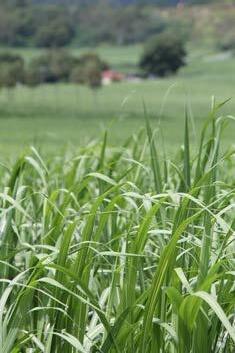
in a timely manner and we remain focused on achieving an outcome that is fair for all growers. Sugar prices continue to look strong for the next couple of seasons and with access to QSL Direct, growers have the ability to take advantage of many different pricing options.
On the back of strong sugar prices and dry weather there has been a relatively small planting of soybeans grown through to harvest. Many of these crops, especially the earlier planted crops are flowering and looking good.
There have been some delays with Oreco payments and interest due on the November and December instalments will be paid to growers upon receipt from Oreco.
Payment for the supply of trash for the period from 1 September to 24 December 2023 is due by way of six equal instalments commencing 15 January 2024. Due to reporting queries and final reconciliation being delayed, Oreco were only invoiced on 24 January 2024, and we hope to receive the first instalment sooner rather than later.
We have been supporting Bundaberg Ag-Food & Fibre Alliance with their campaign running up to the 2024 Local Government Elections. Information regarding their campaign can be found on TikTok, Facebook and YouTube. Tickets are now on sale for the Bundaberg Sugar Industry Dinner and 2023 Season Awards being held on Friday 8 March. This is a great night to celebrate the achievements of the past season, please call the office on 4151 2555 to book your tickets.
We recently met with Isis Mill for our first meeting of the year. We talked at length about some key clauses in the Cane Supply Agreement, harvesting equity, the cane analysis program, audit reports and the mill maintenance schedule. A preliminary crushing estimate will be made available shortly.
As members of the Bundaberg Ag-Food & Fibre Alliance we are supporting a coordinated local government election campaign with an aim to change the culture of our local Council. We want a functional transparent council who act fairly and equitably and only a change in the people on our Council can affect a cultural shift like this.
We are calling on our community to vote with their feet at our local council election on March 16.
The Bundaberg Regional Council imposed an excessive rate hike on agricultural land in 2020 despite elected representatives making preelection promises to the ‣
Cane, Richmondcontrary. Our aim is to ensure this does not happen again. We want a Council who will work with us for the good of everyone in our community.
It is really disappointing to report the marked rise in the theft of farm machinery, vehicles and fuel across the Isis district. The number of
Summer has been kind for growing conditions and we have missed any major weather events so far. Weed control remains a focus for many, but the crop condition is very good at this stage of the year.
The productivity services had been working on a soybean competition for best yield this season, but unfortunately it has actually been too wet in a number of areas to successfully plant.
Contact with Isis Mill is now focussed on understanding early estimates for the season ahead. Trailer maintenance is significantly more advanced than last year, and cleaning of
Rocky Point continues to experience intermittent wet weather, with approximately 150mm across the district on 16 February, followed by light showers and sunshine.
The cane crop is enjoying the constant rain and warm humid conditions.
There were growers that only planted soybeans in midFebruary, and with the ground
the trailers was completed at the end of last season.
The CANEGROWERS office has been contacting harvest operators for understanding on maintenance & repairs, following what was a tough year for reliability in 2023. Reports so far have most groups working on machines or haulouts and having success in locating necessary parts. There are a few changes within harvest groups and if you do have changes to farms in the group it would be best to forward an email of the changes to the cane supply officers in the next few weeks.
Prior to Christmas the mill indicated having early draft rosters out to work out improvements and changes
suspicious unplated vehicles scoping farming properties is unprecedented. It is good to see the growing community banding together to improve
district vigilance with the assistance of an increased presence from QPS in the area.

before we get to season proper. This is still on track to happen once the farm map data has been collated.
Upcoming activities:
• 6 March will see shed meetings at Bauple and Maryborough, combining
updates from Isis Central Mill, Maryborough Cane Productivity Services, QSL and CANEGROWERS . Times and venues to be confirmed.
• 17 April—MCPS Bus Tour / Field Day. New trial plots this year and more details to come.
profile still full from the flood in early January, some late plant beans were lost due to minor flooding.
Growers received fire ant bait from the FAST team just prior to Christmas, with the intention to apply the bait across entire farms by the end of January. However, the excessive rainfall over Christmas and New Year made it impossible for most growers to access their farms before the crop got out of hand. The growers had only just been
able to access many of their farms after the December/ January deluge and are now again struggling with access after recent rainfall.
Directors met with the Valuer General’s office about the 2024 land values, and we believe it will be recommended that values remain unchanged for this year.
Rocky Point, in conjunction with SRA, have commenced initial plans
for a bus trip to NSW on 16 April to learn from our NSW counterparts in the areas of sugar pricing, varieties, and harvesting.
The growing sector offer our condolences to Mrs Pat Heck and family after the passing of Rocky Point Mill owner, Mr Bill Heck recently. Bill Heck was front and centre of the Rocky Point sugar industry for many years, and the sad news of his passing will be felt by many in the district.
Breviglieri’s B300DT rotary hoe is a powerhouse designed to thrive in Australia’s tough conditions.
With a robust build capable of handling up to 300 horsepower effortlessly, it’s a symbol of reliability and strength. Built with durability in mind, featuring DuoCone seals and Hardox® steel rotor flanges, it withstands the harshest environments, encouraging longevity.
Available in 360 and 400cm working widths, it ensures accurate soil preparation and cultivation, optimizing crop yields and intern boosting efficiency and productivity. With its power, durability, and precision, the Breviglieri B300DT rotary hoe empowers farmers to tackle tasks with supreme performance, driving success in the field.
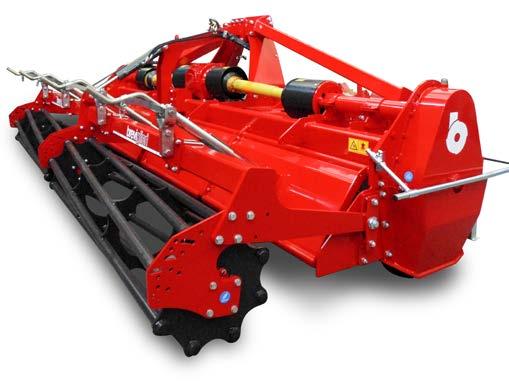

The sugarcane industry is in mourning following the passing of Tom Callow, a founding Director of CANEGROWERS Burdekin.
Tom had seen many changes in the industry during his time on the Board and in his farming life since the late 1950’s. Tom’s time on the CANEGROWERS Board began at the deregulation of the sugar industry, transitioning from mill suppliers’ committees to cane growers’ organisations.
Tom’s first CANEGROWERS directorship was with the Inkerman Mill Suppliers Committee in 2001. Becoming Deputy Chair of the replacement organisation, Inkerman Cane Growers Organisation Ltd, in 2004 and Chair for his final term, leaving the Board in 2010.

CANEGROWERS Chair Owen Menkens served as a Director with Tom.
“Tom was a very intelligent and passionate advocate for the sugar industry. He was a forward thinker with regard to industry issues and a firm believer in all farmers working together to the benefit of industry,” Owen said.
CANEGROWERS would like to express our condolences for Jan, Leigh, Fleur and their families.


The sugarcane industry remains committed to further reducing the risks of water quality impacts on downstream ecosystems, where such on-farm measures are practical, evidence-based, and economically viable for growers and the industry as a whole.
In fact, growers have already significantly reduced the risk of water quality impacts through changes, over the last two decades, in practices such as trash retention, improved efficiency of fertiliser and pesticide inputs and improved irrigation practices. Some of these practice changes occurred through participation in one or more of the Reef Rescue and Reef Trust programs operating since 2008.
But instead of recognition for their efforts, growers were consistently labelled as poor farmers in a series of Government Report Cards on Reef water quality. These reports were deeply flawed including their requirement for universal adoption of certain practices, many of which are either uneconomic or of uncertain value for growers.
We have consistently advocated for major reforms of arrangements under the Federal-State Reef 2050 Water Quality Improvement Plan (2050 WQIP), including abandonment of the current report card process and an independent review of government targets for land management practice change.
While the Queensland Government eventually agreed to an independent review in 2022, the lack of time and effort to do the job properly led to a job half-done and a report with many spurious assumptions. There has been no government action on this review for the past 15 months.
Now it seems the review is to be re-booted. But we have no information on its conduct or governance, except that

we should all happily muck in and get something done, presumably on another timetable set by the government.
CANEGROWERS ’ participation in this review will depend on the government’s commitment to do the job properly this time, including proper economic analysis of practice options and realistic assessments of likely adoption rates.
We will also insist the review’s outcomes inform agreed project investments, and that progress towards targets will be the responsibility of these investment programs. We must not repeat the situation where responsibility was deflected on to growers, just so government had a scapegoat to blame for their own lack of success.
We must also take note of the recent commitments to reach water quality targets made to UNESCO by the Federal Government:
“By February 2025: accelerate progress to achieve all water quality targets through a program of sediment, nutrient and pesticide reduction through combined efforts in regulation, incentives, and accelerated landscape restoration programs.” Dates for reaching these targets have been pushed back several times since 2009. It’s not clear what the new target date will be, but 2030 is mentioned in the correspondence with UNESCO.
For sugarcane, the key water quality target is a 60% reduction in dissolved inorganic nitrogen loads (relative to loads in 2009) from catchments discharging into the GBR lagoon. Progress to date is estimated to be a 28% reduction (based on reef project data only), leaving up to 32% of DIN reduction to go.
How will further reductions in DIN be achieved? The government has already placed a cap on the whole-farm amount of nitrogen that can be applied to sugarcane each year. There is limited scope for any further reductions in average farm rates of applied N, so the obvious question is where do the additional reductions in DIN come from?
There will be opportunities in some situations to improve crop yield and N uptake with improved soil management (e.g. liming) or more precise irrigation management. But measuring the outcomes from projects targeting these practices is problematic as trends in yield from year to year are confounded by climate, making it difficult to discern practice change effects on nitrogen use efficiency over time. These opportunities should be explored. However, we should also insist on an analysis of the scope for practice change to produce additional reductions in DIN. Our reading of government’s water quality modelling suggests that, if all growers adopted the regulated method for N rates, there would be a 30-35% reduction in DIN relative to 2009. Analysis of practice change projects since 2009 suggests we have achieved close to a 30% reduction already, supporting the view that further reductions through practice change will not be easy to implement or measure.
Such analysis will help define the role of more novel approaches, such as constructed wetlands or vegetated drains, and will foster realistic expectations of what can be achieved.


Last month Chris Cooper touched on some of the legal things to think about pre-season. These mostly revolved around the cane supply agreements and the issues growers should be aware of and the things they need to do to meet their side of this agreement. It may be worth a look if you have not seen this article.
When I think of all the other legal requirements facing growers, I tend to get a headache. The red tape is almost impossible to keep up with. Having said that ignorance of the law is no excuse.
In 2014 the Heavy Vehicle National Law (NHVL) came into effect and as we know this completely changed the process of applying for permits for agricultural vehicles. Permit applications went from the district level Queensland Police in 2013 which growers understood well to Queensland Department of Transport and Main Roads (TMR) in 2014 which neither TMR or growers had done before. Effectively the system broke down for a period.
CANEGROWERS were instrumental in getting a range of Notices covering the sugarcane growing regions. These Notices were then combined into the harmonised National Class 1 Agricultural Vehicle and Combination Mass and Dimension Exemption Notice under which most oversize agricultural vehicles in the sugarcane industry currently access public roads.
Today permit applications must be made through the National Heavy Vehicle Regulator (NHVR) portal and although there have been some teething trouble and growers have had to apply online this is the process.
In progressing harmonisation NHVR are in the process of taking over the heavy vehicle enforcement role from State bodies and announced that they will take over the heavy vehicle enforcement role from TMR on 20 April 2024. NHVR is in the process of employing a significant number of the current TMR enforcement team and adding some more.

Essentially the same TMR people, but they will now work for NHVR.
Will this bring about a change? It may well do so with NHVR having the mandate to harmonise not only regulations but also enforcement across the country.
With this in mind I urge growers to check if they need a permit, and if they do, apply for one. Don’t make the excuse that it is too hard. The consequences are not only in the enforcement action but can be significant if you do have an accident and public liability does not pay. There are some good resources on the CANEGROWERS members website to determine if you need a permit.
Another issue to be aware of is that in 2014 national load restraint requirements for heavy vehicles also became effective. These state that “a load on a heavy vehicle must be secured so it is unlikely to fall or be dislodged from the vehicle” and “an appropriate method must be used to restrain the load on a heavy vehicle”.
An appropriate restraint method is one which prevents the load or any part of it from being dislodged from the vehicle. This included heavy vehicles transporting cane and with harmonised enforcement the industry will need to look at the options to comply.
CANEGROWERS is committed to working with NHVR and the industry to address this issue.

In sugarcane growing regions along the Queensland coast, paddocks of sugarcane reach towards the tropical sun. Encouraged by the humidity and soaking rains of the wet season, the crop emerges from strong roots to be tended by nurturing hands with years of experience.
Now, picture a young sugarcane grower, their eyes bright with ambition, standing on the headlands of tradition and innovation, looking towards the future. In this pivotal moment, an experienced and nurturing hand could be exactly what this young grower needs to reach their full potential.
Guidance through mentoring can help young growers achieve success, not just in farming, but in their businesses, their families, and their communities.
That’s why CANEGROWERS is investing in our young leaders and supporting their ambitions.
The Next Ratoon Mentoring Program is connecting seven eager and aspiring young growers with experienced and knowledgeable mentors from both inside and outside of the sugarcane industry.
The program is designed to build strong connections, negotiation, decision-making and leadership skills as well as lasting connections to help them contribute to a profitable and innovative sugarcane industry.
The seven mentees are sugarcane growers that run their own business or are part of their family business. These mentees come from the Tableland, Mackay, Proserpine, Herbert River and the Burdekin sugarcane growing regions.
Next Ratoon started with a two-day launch event in Brisbane on 27 and 28 February. A six-month mentoring program has been designed by Pragmatic Thinking, a highly regarded and sought-after behavioural and motivational strategy company. Mentoring has begun and will continue between March and August 2024 with monthly mentoring sessions, online learning modules, and regular check-ins with CANEGROWERS and Pragmatic Thinking.
CANEGROWERS asked the mentees what they would like to achieve from the Next Ratoon program and they reflected a shared vision for the sugarcane industry’s future, emphasising financial innovation, sustainable practices, engagement with our younger people, industry transition, and improved public perception. They would like to see increased investment, the adoption of best practices, more use of renewable energy, and educational initiatives.
The common thread is a commitment to enhancing skills, knowledge, and networks for the betterment of the sugar industry. The mentees want to boost their professional skills, knowledge of industry dynamics, and leadership capabilities. They have a desire to contribute to the industry through leadership and advocacy for positive impact.
Next Ratoon is supported by seven mentors. A mix of men and women from within the sugarcane industry and across agribusiness. Next Ratoon would not work without mentors and I am very appreciative of the experienced business leaders who have willingly offered their time to support our mentees on their journey. These connections can turn into life-long relationships which can help to guide and support their personal and professional aspirations.
Mentoring is not merely about transferring knowledge; it is the cultivation of dreams, the tending of aspirations, and the fostering of resilience. It’s the seasoned grower sharing tales of triumphs and tribulations, instilling in the next generation a profound respect for the land and its rhythms. It’s the industry leader stepping into the circle at the shed meeting to listen to the challenges of the season. It’s the experienced individual who can offer their insight to help with guidance. But beyond the practical skills, passed down from mentor to mentee, lies a deeper significance. It’s about preserving a legacy woven into the very fabric of rural life, ensuring that the bond between the grower and the land endures. It’s about sparking a fire within young hearts, igniting a passion for sustainability, innovation, and the stewardship of the land, the history and the future.
I am excited to watch the mentees grow and hear about their journey.


Much of Queensland’s vast sugarcane crop is grown in coastal areas.
Some of these cane growing areas are adjacent to or subject to the influence of nearby tidal areas. The Queensland Government has in place many laws regulating these coastal areas and has detailed legal regulations relating to marine plants and fish habitat areas. The enforcement of these regulations appears to be on the increase, and I would not be surprised if the Government further increases its enforcement role next year with environmental issues likely to be a hot political topic in the lead up to the October election.
Let’s take a look at some of these laws and regulations. Marine plants are protected. Under section 123 of the Fisheries Act penalties up to $50,000 can be imposed for unlawfully removing or damaging or destroying a marine plant. Marine plants are plants (dead or alive) that grow in or adjacent to tidal lands. They include mangroves, sea grass, salt couch and associated plants such as melaleuca and casuarina. These laws apply equally to all types of land tenures including private freehold land.
Approval to interfere with marine plants can be applied for through an appropriate development application process. In some limited cases, property maintenance or
minor impact works may be undertaken without a specific approval provided that the specified accepted development requirements are met.
Queensland Boating and Fisheries patrol officers have the power to issue on the spot fines for offences against the Fisheries Act and in more serious cases can institute prosecution proceedings in the Magistrates Court. If the necessary approvals were not obtained, then potentially prosecution proceedings can also be brought under the Planning Act for carrying out assessable development without a permit.
Given the extent of penalties that can be imposed, it would be prudent to check with relevant authorities before interfering with marine plants or you might be stung by a penalty notice.
This article contains general advice only. The particular facts and circumstances of each case always need to be taken into account.
The comments in this article are general in nature. For further free advice and information about this topic or other legal matters, members should contact their local CANEGROWERS office or please contact CANEGROWERS Legal Adviser, Chris Cooper on Free Call 1800 177 159
With rising land prices making it difficult to gain a foothold in the agricultural industry, Queensland Rural and Industry Development Authority (QRIDA) Regional Area Manager Tegan McBride is helping up-andcoming farmers locked out of the rural property market embark on alternative pathways to a career on the land.
“Lease-farming is a great way to get a start in primary production without the high debt and risk associated with land ownership,” she said.
“This way, you can invest your money in other capital such as equipment, machinery, livestock, or crops, while you build a business case for your farm operation.
“Then, when you’re ready to invest in your own land, you’ll be able to show the cashflow and farming experience you’ve built while lease-farming which may look attractive on a rural property loan application.”
QRIDA has First Start Loans of up to $2 million that can help aspiring producers enter lease-farming arrangements.
“These loans can help aspiring primary producers build their farm business as part of a longer-term plan to operate a viable enterprise,” Tegan said.
As QRIDA’s Regional Area Manager for Central Coast and Whitsundays, Tegan has experience helping a range of primary producers, and said leasefarming benefits all involved.
“Farmers transitioning into retirement can continue to make money and reduce expenses by leasing blocks of their land, and those impacted by fluctuating markets might also benefit from lease-farming to create a diverse income stream and maximise their property’s productivity,” Tegan said.
“For primary producers who are getting started, lease-farming can give them an opportunity to try their hand at farming while gaining knowledge from the lessor producer who might take on a mentor role.”
Tegan encourages Queenslanders passionate about agriculture to consider a long-term career in the industry.
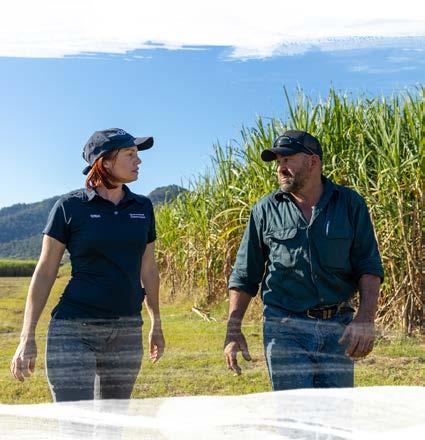
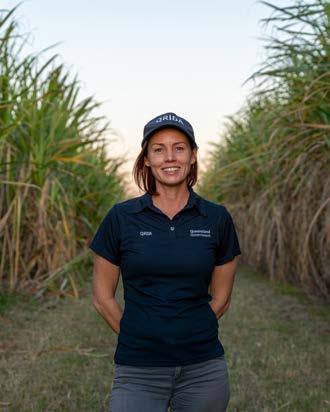
“While it might seem a bit daunting at first, primary production is a really worthwhile and rewarding career and provides the ability to produce something tangible that helps feed other families,” she said.
“If you have any questions about how QRIDA could help you make your dream farm business a reality, please contact us.”
For more visit qrida.qld.gov.au or call QRIDA on 1800 623 946

FIRST 5 LINES FREE* FOR CANEGROWERS MEMBERS!
Book online 24/7 at www.canegrowers .com.au or email us at ads@canegrowers .com.au
Next deadline is 20 March 2024
MOSSMAN TULLYHarvester for sale. Babinda Area. 2010 JD 3520 track harvester. 10,000 frame hours. 1,200 hours since engine rebuild. 10 blade Twyford choppers. Base cutter box, turn table & chopper box, 300 hours use. D5 Tracks READY TO GO. $180,000 & GST. Ph: 0439 676 186
Valley centre pivot 8 span all running gear tyres & rims $1,000 gearboxes $750.00, electrical motors & gear boxes$1,000 each ono. 6 irvin spray legs $80.00 each, 2x torsion axles v -shape 2200kg each $500 ono.
Ph: John 0418 198 177
Celli Rotary Hoe 120 inch good condition $6,000 + GST ONO. Front bucket for 580E backhoe $800 + GST ONO. Ph: 0407 675 361
Plant cutter $200; cane stripper $500; binder billet planter $18,000; 2 x Newton 4T Tipper bins $4,000 each—All plus GST.
Ph: 0429 653 461
6 Cyl. Perkins Turbo-Charged motor, mounted on trailer to Kelly & Lewis water pump $5,500; 6T Newton bulk fertiliser bin $2,500. Please call after 7pm or txt 0402 686 714 / 0407 144 637
One tonne bag lifter $2,200 GST incl. Ph: 0448 345 139
USED/NEW MACHINERY FOR SALE
SECONDHAND 8970
JOHN DEERE TRACTOR
NEW CYCLONE SLASHER/MULCHER
All machines located in Ingham.
DIESEL FITTER POSITION AVAILABLE
PARTS MANAGER POSITION AVAILABLE
Contact us via phone or email for further information.
SNG Machinery Sales
90 Origlasso St, Ingham
07 4776 6003 (Parts)
07 4776 1066 (Sales)
admin@sngmachinerysales.com www.sngromano.net.au
* As a FREE service to CANEGROWERS members, Australian Canegrower will print suitable classified advertisements UP TO 5 LINES FREE, FOR ONE ISSUE ONLY. A charge of $5. 50 will apply for each extra line or part thereof. A charge will apply for advertising of non-cane growing activities. Advertisements must relate exclusively to cane farming activities, such as farm machinery, etc. Advertisements from non-members are charged at $11 per line incl GST. Only prepaid ads will be accepted.
2012 Case 8800 fulltrack cane harvester fitted with Trimble GPS and new walking gear. All in good condition. Near new 6t side tipper. Mulgrave area. Ph: 0407 160 673
Kubota Zero Turn ZG 222 with Catcher 48” cut. Fiat 980 2WD—3,500 hrs, Fiat 1000 2WD— 5,000 hrs, John Deere 4040 2WD—3,600 hrs, Chamberlain JD 4080 2 WD—5,000 hrs, Case 2590 2WD—5,700 hrs, Massey Ferguson 3635 4WD—5,500 hrs, 6 tonne tipper bin, Silvan Euro Spand CX2 Spreader, portable bulk bin, Bunning Lowlander Mk 40-60 Ag Spreader (near new), complete tracks to suit cane harvester, and fuel trailer tank. Mulgrave area. Ph: 0407 160 673
1968 International Farmall 756, 2WD, Tricycle, 6 cyl, 5,560 hrs, $5,950. 1993 140” Howard Rotary Hoe, crumble roller, serial 060301095, $24,500. 2006 Case iH 7700 full track harvester, Iveco 10.3 litre, 6 cyl motor, 2912 hrs, $156,000. 1976 rear feed whole stick planter, s/s fertiliser boxes & chutes, 2x200 ltr spray tanks with 4 sprays, hydraulic ram trailer hitch, $4,250. 1990 8-ton bulk fertiliser bin, 3 easy chute doors, 4 stands for storage, $5,150. Ph: Romy 0467 198 700
1980 Ford 7710, 4WD, 4 cyl, canopy, 5,323 hrs, $21,000. 1960 Inter tractor 574, 2WD, 4 cyl, canopy, $9,500. 1960 Inter tractor 574, 2WD, 4 cyl, canopy, 4891 hrs, $7,950. 1975 Cat D3 dozer, angle tilt blade, 4 cyl, hyd tow hitch, root rake blade, 4,836 hrs, $51,900. 2010 Kubota ME9000, 4WD, cab with trimble with GFX-750 GPS, 5,031 hrs, total for both $47,900. 2018 Kubota, 4WD, M7040, 4 cyl, canopy, 482 hrs, $46,900. Ph: Mark 0427 017 717
Fertilizer bin M.S.W, double row, 4 tonne stainless bin, with double compartment and 4 cutters $25,000 (inc. GST).
Ph: 0400 729 457
John Deere 8320 9,000 hrs $80K, John Deere 7330 8,100 hrs IVT $65K, New Holland 8870 Genesis 210 horsepower 10,300 hrs $63k, John Deere 285R 5,000 hrs $250K.
Ph: 0439 965 921.
Heavy duty two tines (legs) to suit rotary hoe $1,000 incl GST. Ph: 0438 988 858
2022 Case 9900 Cane Harvester. Ph: Craig 0436 332 044
R tank, many more extas. Phone for more details. Ph: Craig 0436 332 044
Liquid Fertiliser applicator croplands rate controler, adjustable centres and new pump. Ph: Craig 0436 332 044
Service unit/fuel tanker, flat 115-90 4wd tactor set up with hitch & brakes. 4500L diesel fuel tank. 2000L aluminium water tank, many more extas. Phone for more details. Ph: Craig 0436 332 044
1956 International Super AMD Tricycle Tractor—good condition—Tully Mill Area— $3,000 ONO. Ph: 0428 850 214
Valley centre pivot 8 span all running gear tyres & rims $1,000 each, gear boxes $750 each, electrical motors & gear box $1,000 each, 6 Irvin legs make an offer, 2x Torsion axles V-shape 2200 kg $500 each. Ph: John 0418 198 177
Bonel whole stick harvester / Double fan cane stripper / Four trailers. Ph: 07 4056 1742
Great Plains 6m 3PL planter, currently set up for zonal planting however have all units for solid planting, $25,000 + GST. Hodge 5.5m (18ft) roller, has done little work since purchased new in 2016, $12,000 + GST. Gason VHD 10ft twin rotor slasher, centre mount, square back, $12,000 + GST. Ph: Peter 0427 976 416
2 x 480/70R34 tractor tyres. 5 years old. 95% rubber. 1 tyre needs minor repair. $1,000 (inc GST) for both tyres. Ph: 0408 728 072 (Tully).
Hydraulic Spraying Machine—High Rise Diesel Motor, 1600 litre stainless steel tank $25,000 + GST. Ph: Tim 0428 183 307
Tatu heavy duty 25 plate offset 2021 model new condition. Ph: 0439 965 921.
Toft 6000 harvester $20k Liquaforce 5 row applicator $25k stainless steel 25,000L tanker on tandem axle trailer $15k 10 tonne side tipper $12k kubota 8580 $22k grubbers ploughs plus more call Rodney. Ph: 0429 984 920
Hodge Bulk bag lifter—$700 (plus GST). Ph: 0439 965 921
Farm clearance sale...all machinery in good working order all reasonable offers considered. 2 x 90" Howard rotary hoes. Fiat 640 Hi Clearance 32" 3,400 hrs, Hardi 600L sprayer 5 row boom +4 irvine spider legs. 3 row plant cane cleaner, Ford 4500 loader backhoe + 1t bag boom + tree trim cage.
New Holland TS125A 125hp 4x4 16 speed ps 11,800hrs. Trailed 4T MSW 3 row stainless steel fertilizer bow with stool splitters or drop on top. John Deere 3130, Superior 8 ft galvanised Hd slasher, 2x 20.8 x38 tyres (30%), rims, centres & weights to suit ford or new holland axle, 900L cropland spray tank. Ph: 0437 504 272
Celli rotary hoe 90 inch $5,500. 2 implement rollers each $100. 1000 litre plus fuel tank on stand $1,100. Single row fertiliser box stool splitter $400. 186 Ross Road Deeral. Ph: 0412 968 434
Olympic 20.8.42 65% $500+ GST; front end loader with 4 in 1 bucket, blasted and 2pac painted, resembling required $4500+GST Ph: 0437 434 280
Kubota Zero Turn ZG 222 with Catcher 48” cut, Fiat 980 2WD-3,500hrs, Fiat 1000 2WD— 5,000hrs, John Deere 4040 2WD—3,600hrs, Chamberlain JD 4080 2 WD—5,000hrs, Case 2590 2WD—5,700hrs, Michigan 110-14
Elevator Scraper—new engine & spare engine, D Massey Ferguson 3635 4WD—5,500hrs, 6tonne tipper bin, Silvan Euro Spand CX2 Spreader, Portable bulk bin, Bunning Lowlander Mk 40-60 Ag Spreader(near new), complete tracks to suit cane harvester, half tracks to suit cane harvester, and fuel trailer tank. Mulgrave Area. Ph: 0407 160 673
2012 Case 8800 fulltrack cane harvester fitted with Trimble GPS and new walking gear. All in good condition. Near new 6t side tipper. Mulgrave area. Ph: 0407 160 673
Rotocult 1 shot cultivator $7,000 ONO + GST. Ph: 0149 988 158
2022 Case 9900 Harvester. Ph: Craig 0436 332 044
2018 Case 8810 Harvester. Ph: Craig 0436 332 044
1 of 2021 Case Puma 225 Cut with 16T GTB Razor Tippers All Articulated units. Ph: Craig 0436 332 044
Babinda area—2006 Case 7700 Track Harvester. 10.3Lt Iveco Motor 3,500hrs. Very good condition. Ph: 0467 198 700 AH: 4067 1498.
Multi-weeder $350; Cane drill marker $250; Silvan 600L water tank $300. Ph: 07 4065 2165
Howard 80 inch Ripper rotary (new blades & new ripper tips) $3,300. GST incl. 2 x second hand tractor tyres. 20.8 38 8 ply $100 ea. GST incl. Ph. 0438 988 858
Silkwood Implements whole stick plant cutter with topper $5,000 Includes GST. Ph: Ron 0407 667 819
36 plate case 770 offsets, 30 inch discs $44,000 and HBM plant cutter with topper $4,400. Ph: 0448 345 139
2015 Case 280 Magnum Ultimate 1,750 hrs—equipped with Case Trimble FMX 1000 GPS $300,000 includes GST. Ph: Ron 0407 667 819
International 866 tractor $11,000, 1,000L plus diesel tank on stand $1,800, 2 Ripper Coulter’s each $1,900, single fertiliser box stool splitter $700, implement rollers each $200, 3 row scratcher $700, line marker $500, 186 Ross Road Deeral. Ph: 0412 968 434
Brought to you by
LD3 Moore Scoop 4WD in fair condition, runs good, brakes need help. Ph: after 6.30pm 07 4777 6148
Case Magnum 315 2012 dual tyres front and rear with weight pack, Trimble GPS, UHF and quick hitch 210,000 plus. Howard rotary hoe
CH 2000 4.7 meters with crumble roller 40,000 plus. Ph: Gavin 0408 782 419
Fiat 411R, good order, 1Mt clearance, $5000 neg. 9ft roller, heavy frame $250 neg. Ph: Troy 0419 477 284
Case Magnum 315 2012 dual tyres front and rear with weight pack, Trimble GPS, UHF and quick hitch 210,000 plus. Howard rotary hoe
CH 2000 4.7 meters with crumble roller 40,000 plus. Ph: Gavin 0408 782 419
Single row Scuderi Fert box mounted on 6 Leg Grubber. Good working order. $250 incl GST
Single row HBM upright stick planter. Working order. $200 incl GST. Ph: 0431 458 850
1997 Fiat Agri Genius 190. Good condition, one owner, Hyd toplink, hubs for dwels—5,200 Hrs.
Ph: 0419 666 544
1996 Fiat 130 with 80 inch Kuhn rotary hoe. Under 2,000 hours. $45,000 + GST for both.
Ph: 0427 337 929
2015 Austoft 8800 harvester. Good condition. Ph: 0499 888 919 or 0429 989 502

▪
▪
BROUAV ▪ spare blades ▪ spare water pump
T7040 New Holland 8200 hrs and 16 tonne Aus quip elevator air/ hyd controls. Farm sold.
Ph: Cameron 0427 378 526
Hodge, one tonne three point linkage side dresser fertilizer box, with coulters + press wheels $3900+GST. Hodge, one tonne three point linkage side dresser fertilizer box, with coulters + press wheels $3900 (+GST).
Ph: 0420 600 943
1973 Ford 5 thousand 2-wheel drive Y series tractor for sale, 75 horsepower, with power steering, new ROPS, new seat, one set of remotes, 8430 tyres—90% rubber on front and 80% on back and 3-point linkage. Always sheded, kept neat and tidy, always serviced and oil dropped every 100 hours.
Ph: 0459 596 782 for price.
1997 Case Top Track Harvester Komatsu engine, big hours, good D5 tracks $33,000.
Ph: Ambrose 0428 475 226
2017 Case IH Puma 140—fully unlocked AFS GPS, fully unlocked Isobus control, 2,200 hrs, tractor in VGC, only selling due to upgrade, arriving soon. $140,000 neg.
Ph: Peter 0409 221 601
Suzuki LT-F 300F $1,100 60HP Western electric motor, foot & flange $2,750. Ph: 0417 158 656
Double row McLeod fertiliser box with various sprockets for various applications.
Ph: 0417 612 883 for price.
6 tonne side tipper Farview Engineering.
Ph: 0407 761 364.
2020 Case Maxxum 135 CVX Premium, 50kph Fully factory optioned, Front 3PT linkage, 4 electric remotes, New One Lift 60 Challenge Loader with 4 in 1 bucket and forks, New Trimble GFX1260 GPS 3,120hrs 160k+GST
Ph: 0427 678 572
Krone 1500 Vario pack baler $16,500. Krone mower 2.8m easy cut flail $36,000 as new.
Ph: 0447 461 132.
AR 50" rotary hoe, fully reconditioned. HR 42 120" rotary hoe, fully reconditioned. Ph: 0407 643 441 for price.
Hodge side dresser fertiliser box with 4 front fertilizer coulters, 2 centre rippers and coulters with crumble rollers and centre drawbar. Also can be used as a soil buster. In the Mackay area. $11,000 + GST. Ph: 0408 874 974 or 0418 874 974.
GPS Autosteer kits, can be fitted to any tractor, FJ Dynamics brand, $12,000 inc GST
Ph: 0401 847 162
Massey Ferguson harvester 102 base cutter box. Ph: 4954 1174 for price.
Elevator chains for 102. Ph: 4954 1174 for price.
7T Tractor 200 auto command, super steer, GPS ready, 5549 hours, great condition, farm work only. $110,000. Ph: 0427 503 738
Rover 52 inch mower, zero turn, Kawasaki motor, 19 horsepower. $4,000. Ph: 0427 503 738
3 point linkage cane topper. Ph: 0417 542 783 for price.
Pegoraro 120 inch rotary hoe in good condition. Ph: 0417 542 783 for price.
4000 litres of 50/50 diesel/petrol mix suitable for firebug burners or parts washing.
Ph: 0411 196 860
Southern cross LAH 7 stage turbine pump. Ph: 0407 595 218.
Water meter never used Siemens brand (no before or after the meter pipework required) 150mm flanged, table D/E Ph: 0411 196 860
6 and 8 inch cast iron flanged gate valves. New never used. Ph: 0411 196 860
1973 Ford 5,000 2wd with 4ton Newton side tipper $11,000 +GST. 3m niemeyer nr1411 Power Harrows $5,600 + GST Ph: 0437 184 822
2 fan stripper $500. Moller single chain planter $4,000. Roberts 6T goose neck trailer $5,000. Grubber & box $300. Hodge upright planter $3,000. Ph: 0408 776 336 OR 4959 1765 after 7pm.
Celli Tiger spike hoe, 2.5m wide with hydraulic crumble roller and oil cooler. VGC. Mackay. Ph: 0438 606 578
Don Mizzi 741 model on Fiat 750 special turbo plus MF102 half-tracks to suit. Mackay. Ph: 0438 606 578
12t self-propelled 6x6 elev infielder. VGC. Mackay. Ph: 0438 606 578
6t side tipper on Leyland tandem. GC. Mackay. Ph: 0438 606 578.
agspraydrone@gmail.com www.agspraydrones.com.au SUPPLIER OF AUSTRALIA’S LARGEST AGRICULTURAL DRONE 48 CLASSIFIEDS
Bonel Plant Cutter for sale GC $450.
Ph: 0428 782 202
Austoft/Case wheel harvester 1995 to 2006 model. Any area. Ph: 0417 193 385
Massey Ferguson anniversary 105 harvester $7,700 (incl. GST); trash incorporator $7,700 (incl. GST); Bonel 3-row cutaway $6,600 (incl GST); 3-point linkage offset 16 plate $2,300 (incl GST). Ph: 0419 577 110
Quinco side dresser fert box, Bonel side dresser fert box, Croplands boom sprayer, Bonel plant cutter, Don stick planter, 3 row folding cultivator frame, 3 row plant cutaway, 5 row plant marker 1.8 ctrs. Ph: 0473 989 961.
FALC 3600 RU rotary hoe with twin bed formers, was set up for strawberries. Selling now as surplus to needs. $25,000 + GST Ph: 0447 714 015.
Howard HR100 inch rotary, Napier 24 plate offset discs, Yeoman 11 tyne chisel plough and other excess equipment. Ph: 0417 617 084
No till vacuum planter fitted with disc openers and John Deere planter boxs, will plant 3rows at 2 x 400mm at 1.6 m centers, has water tanks for inoculant, row widths can be adjusted. Soybean plates included. $16,500 incl GST. Ph: Alan 0409 632 656
New Holland T6070 Tractor, $185K neg Challenge FEL, quad remotes, excellent condition, 450 hrs. Ph: Justin 0415 626 715
7 tonne single axle Hi lift tipper bin $12,000 each plus GST. Ph: 0413 584 728
MF165 H/C 212 engine 8 speed original 4225 HRS remotes ROPs canopy $12,500 inc GST. 2x two row 3PL Faun potato planters set up to lay trickle tape while planting $3,000 + GST each. 30 RJ Hydrant sealing caps, good condition $80.00 each. Two row potato harvester—Grimme D.L 1500—sorting table—canopy $40,000 + GST Ph: 0427 597 363 or 0408 062 830
Brand new Howard AH4000/255 2.5m heavy duty rotary hoe w/wheels $44k inc GST. Rocky Point. Ph: Greg 0421 277 126
Plant cane cultivator 2 x 1.6m row w/ 3 weeder rakes and tines $2,200 incl GST, Land plane w/ 4m. hyd. tilt blade $4,400 incl GST, 2x1.6m. row cultivator w/ 10x 30ml. tines $2,200 incl GST .4 wheel trash rake $ 1650 incl. GST Ph: 0408 761 463
Old cheap cane harvester suitable for wrecking for the hydraulic pumps and components. Ph: Lloyd 0439 375 301. Herbert / Ingham area.
Three point linkage cane multiplier in good condition. Ph: 0408 197 223
1996 to 2004 Toft/Case 7000, wheeled cane harvester. Ph: 0420 600 943
Austoft/Case wheel harvester 1995 to 2006 model any area. Ph: 0417 193 385
WTB—4.5" Layflat hose in good condition. 200250 metres. Ph: 0419 952 119
3-row stool splitter Confidor applicator in good condition. Mulgrave area. Ph: 0415 386 322
All panels for Fiat 780. Ph: 0438 421 217 Mackay / Sarina area.
New Holland 8970 Tractor suitable for wrecking. Contact 0419 710 280 or tctownley@bigpond.com
1x Ford 6600 or Ford 7600 two-wheel drive tractor. Ph: 0439 591 455
6 FT 3 Point linkage grader blade in reasonable condition. Ph: 0478 228 375. Area Bundaberg.
Trailer with side tippers suitable for billet planter. Ph: 0448 482 213 before 7pm.
WTB 11-12ft roller—Herbert River area. Ph: 4776 1386
Chasing some unwanted plow discs to use on a fire pit project. Ph: Simon 0448 744 013
Wanted—crumble roller to suit Howard HR40 90" rotary hoe or two 50cm steel depth wheels. Ph: Alan 0467 786 464
Wanted hi-clearance spray tractor. Must be a trike and must have air con cab. Send photos and information to 0407 639 985.
Wanted permanent purchase Lower Mary River Water Allocations on Mary River, Tinana Creek and Channel Pipeline sections of the scheme. Ph: 0427 930 696
WTB Tractor with FEL 100-140 HP up to $50k. NQLD area. Ph: Peter 0427 760 449
Double 5 or 6 tonne side tipper with load sharing hitch. With or without tractor. Ph: 0418 379 253
14 tonne elevator bin and tractor 50klm box or more. Preferably JCB. Ph: 0400 794 857
Wanted 2 X 2ND hand tractor tyres. 14.9—23 to suit Massey 35. Ph: Michael 0419 952 119





